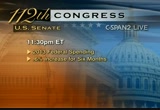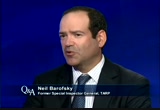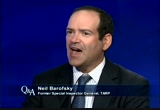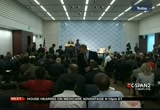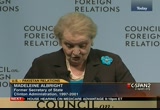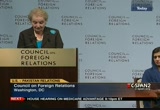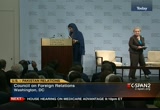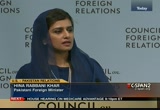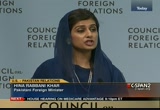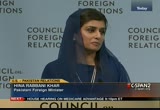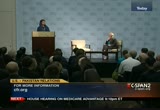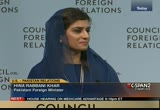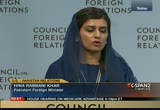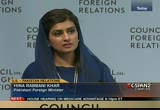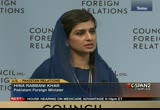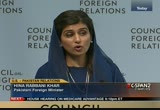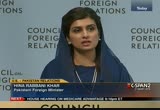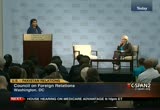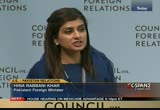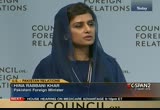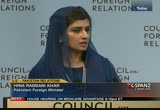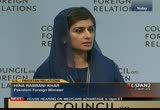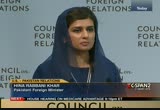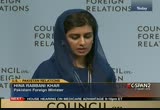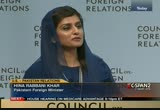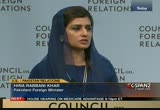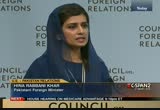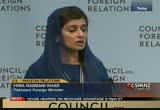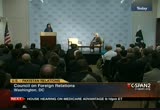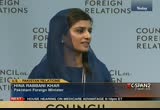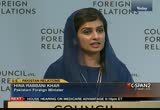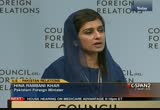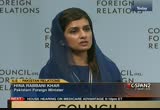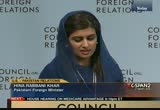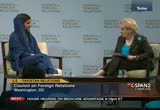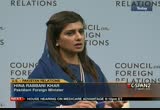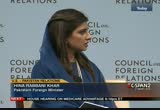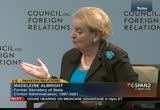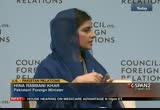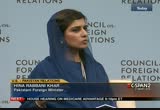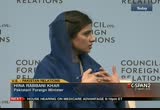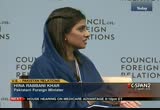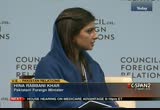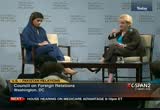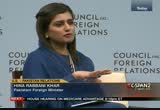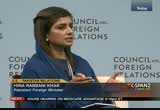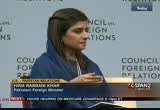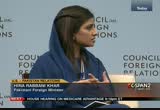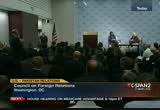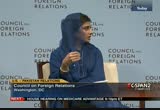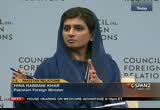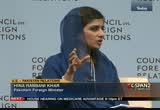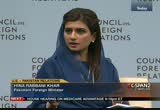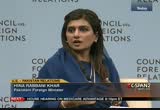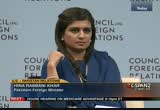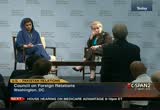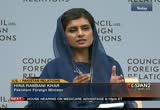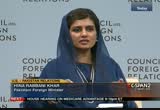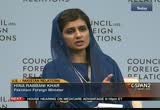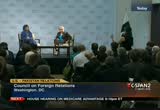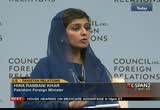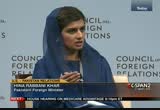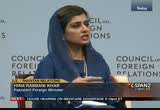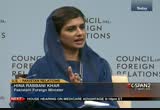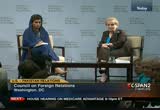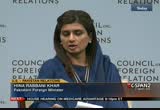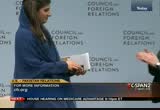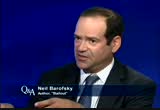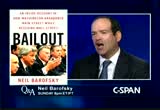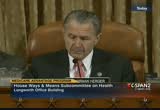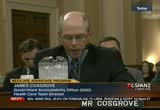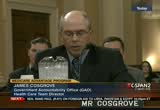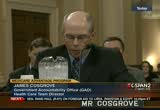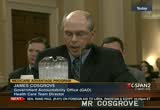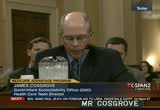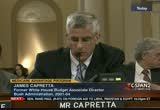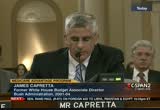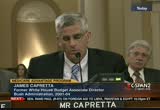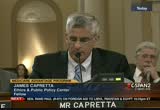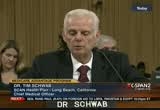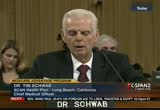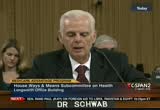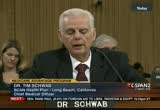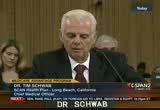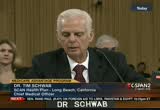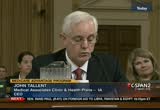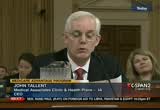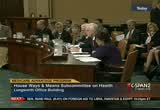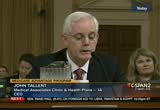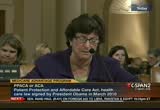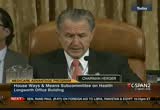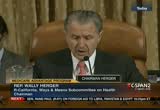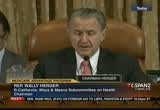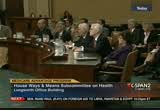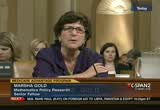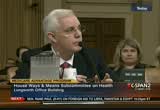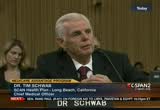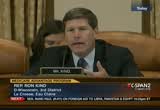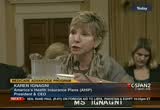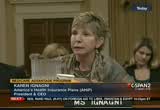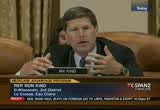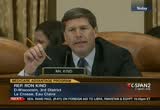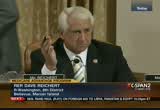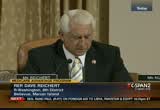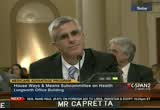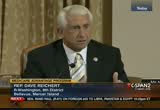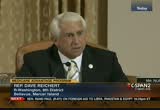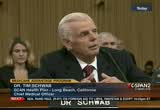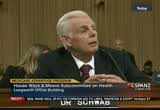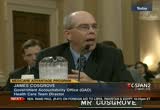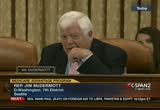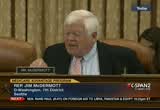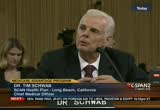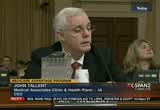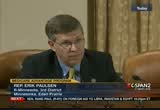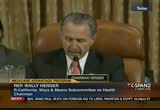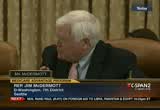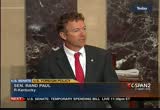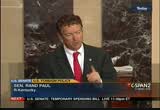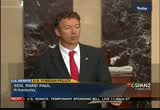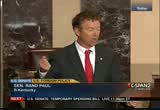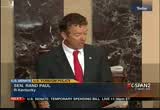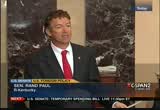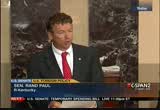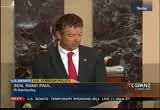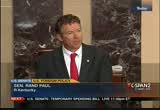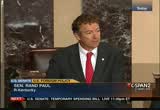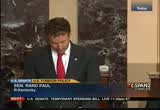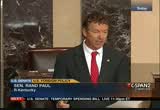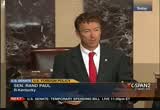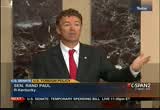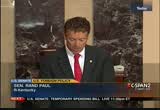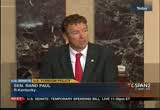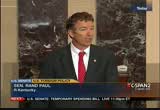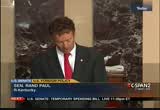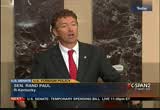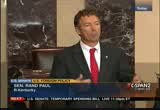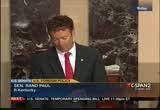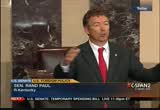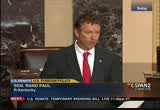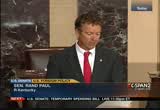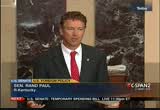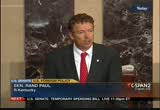tv Tonight From Washington CSPAN September 21, 2012 8:00pm-11:00pm EDT
8:01 pm
washington, i didn't know what an ig did. my experience was as prosecutor resell them occasionally would run into bond oarsmen arms. they would be her agents a nursery mortgage fraud cases i started up a mortgage fraud unit and i was to the inspector general from hud, which was very good on first nations. but i did know the big picture of what an ig was doing. when i got the job when i came down, one of the first things i did was going to meet the different ig's. starting with those meanings in over the next couple of years, i found the inspector general as they call them, unfortunately they're supposed to be fierce watchdogs looking out her waist from a fraud and abuse. those are the magic words in the statute of what they're supposed to be doing, we would become often like any other governmental v. the number one concern seemed to be things about their budget, how to preserve their budget. they are very worried about clashing with management. worried about too much interaction with congress.
8:02 pm
it was really very much ago along, get along type of attitude. what i kept hearing over and over again as three types of different ig's. a lapdog would presumably curl up in the lap of management and i was discouraged. a watchdog commotions in between between any junkyard dog. ultimately when i was going through the confirmation process, i was told by senator baucus who is the head of the finance committee, which oversta junkyard dog. >> now discussion on u.s.-pakistan with the foreign minister. former secretary of state, madeleine albright at the council on foreign relations. this is just over an hour.
8:03 pm
[inaudible conversations] >> good morning, everybody. thank you very much for being here and i can only assure you that we are going to provide you with a fascinating discussion. i also want to welcome the council of foreign relations members from around the nation in the world who are participating by telecom friends. on a housekeeping note, please completely turn off, not just vibrate to avoid any interference with the sound system. and then also as a reminder, this meeting is on the record. now, with all that out of the way, let me say i really, really pleased i am to introduce this
8:04 pm
woman, foreign minister. i just have to say when i arrived in new york as our ambassador to the united nations come at that time there were 183 countries in the u.n. it was one of the first times they didn't have to cook lunch myself, so i asked my assistant to invite all the women representatives to lunch. and i thought there'd be a lot of people there. when i got there, there were six other women. because i am an american, i formed a caucus that we called ourselves the g7. and we did in fact worked together very closely. when i became secretary of state, i created a group of foreign ministers. and so at that time, there were like 14 of us. not very many, many more. an no, i am very, very happy to be able to welcome a woman who is part of that group.
8:05 pm
the funny car is a powerful example of why having more women and senior government positions are so keep it as the first pakistan foreign minister, she is joined benazir bhutto in blazing and historic path for women in pakistan and she is taking her kanshi's toughest challenges at a time of great upheaval and uncertainty for much of the world. in a year, and mr. carr bears khar is resolving regional and global problems and i think some of us wholeheartedly share. we are very fortunate to have this chance to hear from her concerning her perspective on pakistan u.s. relations and other topics that may be on our minds. so please join me in gritting our distinguished foreign minister friend, hina rabbani
8:06 pm
khar. [applause] >> good morning to everyone. let me just say it is truly a matter of privilege for me to be here and with madam albright to this wonderful meeting. let me acknowledge the role that the cfr plays in the dynamics of your country. we hope pakistan is also emerging, which indicted says they move forward. it is a gentleman, i would like to take the opportunity today to be able to have a frank and honest discussion because madam albright is increasingly finding out that in our days now, almost everything is on the record. so even off the record is pretty much on the record. but as we move forward and talk about pakistan u.s. relations, the new dynamics are emerging
8:07 pm
dynamics where we are able to achieve together. i think it is important to first talk about pakistan because i have often said in the last few days that the foreign minister of pakistan, as prime ministers are talking more about what pakistan is not about rather than what pakistan is about. i think there are misperceptions about pakistan, pakistan's intense, pakistan's policy dynamics, about how pakistan perceived or what it conceives to be in its national interest. the misperception is the misperception of the real intention in the region and within pakistan that sometimes it seems that pakistan is quite literally on the side of that if were to believe other misperceptions about pakistan, which are given to it. now, in order to talk about
8:08 pm
pakistan, the potential pakistan u.s. relations come it is important to look at what pakistan is today an even more importantly, what the future of pakistan is. and again, as they often say, it is the foreign nine. there is a lot of good happening within pakistan, a lot of democracy finding real roots in pakistan democracy starting to develop. in order for rest to invest, let me come straight to that. they sold the next few months be the first transfer of power from the civilian government. under an election, which is set after the 20th amendment to the constitution looking forward and more independent elections. this in itself is going to hopefully create diverse ability of democracy in pakistan and
8:09 pm
therefore no longer talk about civilian government to pakistan's because there's only one type of government they won't talk about. ladies and gentlemen, there have been a majority when it elected its first prime minister, we have been able to go through 32 thirds majority constitution amendment and one which we are particularly proud of is the amendment to the constitution, which in 1873 constitution, which came under the severity doctrine. i was an important? there was a consensus constitution which brought that back. within the constitution, not only was that required to go to school, but it is not the responsibility of the state that all those event must be educated. so this is why we have the
8:10 pm
political parties in pakistan, but we come to recognize a national interest to political party of pakistan today have endured to come together and strive for a future that is better. with this amendment of the constitution, we correct a lot of historic qualms that have been in pakistan. pakistan is conceived to be a federation, having resource and responsibility. over time, 30 odd years under dictatorial regime, they found more and more civilization of power and resources within the center. i am proud to say today we decentralize that and therefore i don't fear for the future anymore because the resources today bear the responsibility to teach them in to feed them and to close them and to give them stability. also, in all of this, pakistan is marching forward with an institution like never before. an excellent example of that is
8:11 pm
the free and independent judiciary which sometimes is not very helpful in the sense that we are proud of the fact that despite the many challenges that some of these issues, you know, are faced with, the government is faced with, the government will ensure that we have a free independent system in pakistan. we also have one of the most interesting and one of the most free media anywhere in the world. with 60 generals talking about what is not able to do rather than what it has been able to do also create a lot of hope for the future. i am now going to talk about two things, which define what democracy has been able to do in pakistan more than anything else. into two areas in which i think the results are already there. one of those areas is the
8:12 pm
ownership of our fight against terrorism. i don't know how and if you know, that the government in 2008 with the perception of packets and -- the electronic media or the print media was the world work, which is in pakistan and pakistan was fighting the war. it was his government and the leadership of president zardari which came in and gave ownership to the site. this was a fight for the future, certainly with the future of stability in the region, but for the future, a site which is killing our soldiers. i don't know how many of you know, but in the last 10 years, pakistan has lost more than 40,000 people together, 40,000
8:13 pm
lines. in the last five years only, we have had almost 352 suicide bomb attacks and allow me to share with you that pre-9/11, we only had one suicide attack. allow me to share refute economic losses have been colossal and tens of billions of dollars, estimates ranging between 75 to $100 billion. and in all of various, what is most at risk is our way of life. what is most at risk is the type of society we want to have. the biggest fight a think that all of us collect it late months site is the ninth that, which is prevalent amongst those who try to destroy us. an insane mess, let me say when you talk about the threat and
8:14 pm
the dangers and challenges pakistan faces, maybe an certainly, a lot of other countries in the region are also. but there are challenges that pakistan face today have genesis in some historical react. as you said, madam albright, the unintended consequences of the decision you did many, many years. so therefore, ladies and gentlemen, the decision-making of today and how we manage our foreign policy in territory took consequences for the future. allow me to share with you do what is happening in pakistan today in some ways it's a hangover or a leftover for what has happened in our region many, many years back. the arms and ammunition -- first of all, let's talk about what happened with it. we know that during the war in the soviet era, we all
8:15 pm
collectively, at least this country and mine come at least your country and mine collectively chose to harness religious and work within the grd to fight as an instrument. we did that collectively. but it was done on our choice. the arms and ammunition, the training given was meant as the u.s. and strategy, we declare and move on. some of us were able to move on. the others were left over with the mindset, with the training, with the ammunition, until today after three decades, we are still suffering from each one of those. we are suffering the consequences of each.
8:16 pm
and to me the biggest challenge in all of this and how it has destroyed our society, how there is the biggest challenge we have to face. ladies and gentlemen, from the lessons we've learned from the past, it is important to apply some of these is a look at the future. as a look at the challenges we face within the region, pakistan has grave concerns over what is going to happen. we are again going to go and talk a little bit about her relations with afghanistan and how we review our relationship. allow me to say what we do not want. it is not important to say what we do want, but we do not want specifically describes to
8:17 pm
pakistan. that is and gentlemen, first of all, let me say it is not ambition, that anxiety. allow me to say that we have no favorites in terms of ethnicity, groups. pakistan today to develop relations with afghanistan's and this to me is a big achievement of a democratic government in pakistan. pakistan today for instability in afghanistan because through the 2000 plus barometer of what we have directly into pakistan territory as of the last three decades. their 53,000 people, which are ordered every day. you can imagine the permeation and instantaneous effect than the instability.
8:18 pm
allow me to say that we seek no strategic depth. allow me to categorically say that. the other deaths we have our friendly, not even relations with afghanistan on the principle of afghanistan. a sovereign afghanistan and independent afghanistan. we have no intention, nor any national interest to impose any type of government in iran. why all of this is described to pakistan typically is because as i said before, i think it is important that we are regaled to unload the past and move into the future as i fear for your not able to do that, we will see ourselves inadvertently repeating the statement. it will be the consequences of not realizing reality as it is listed.
8:19 pm
now, if we look at, since i was talking about the ownership of the war and terrorism in the challenges pakistan faces today, and means we can underestimate them. we are of course very, very concerned about the state because we know the entry in afghanistan were very, very different than what is appearing to be of the constitution. what we want from the world, what we want from the 49 nations, which are operating in afghanistan is that there's no security vacuum. they did in jenin for us, i wish you the get what is happening enough guinness and. until about 2007 for multisite extreme of the more than 5 million refugees going back. since then, especially since
8:20 pm
2009, we almost the reverse trend. pat to me does not bear a lot of confidence. pat to me does not look like we are achieving their growth that we set out for ourselves. recently, the incidents that we've had a green and blue attacks and the decision not to go through joint training are all huge concerns for pakistan. these are huge concerns because we would not be able to change our geography because we must make sure that the security situation in afghanistan is good enough for us to be able to build a peaceful and stable neighborhood. recently from the area in afghanistan, there is spend a situation in pakistan were as
8:21 pm
many as recently as three weeks back beheaded 17 authors. all of these are not signed, but inspire a lot of confidence in the security situation. through the long border, we will have to face more challenges in the future. as we move forward, it is important that we are able to get out of the trust. i have said what pakistan and what is not in pakistan's and allow me to say that what i consider to be the primary national interest of pakistan is a peaceful and stable, not necessarily friendly, but a peaceful and stable afghanistan because we know from history the
8:22 pm
recent stability would not be a look to find our stability and we will not po2 grow economically the way we wish. will not find goals for our children that we wish to achieve. so it is considered to be of interest and we put all of our energy together to achieve those things. what is the best possible scenario we can dig up? the best possible scenario we can think of for 2014 is that elections take place in afghanistan, all are able to demonstrate the strength, there will through the election process. and that is a future that we must be working in the immediate future we must work towards.
8:23 pm
i'm just going to end by talking a bit about how democracy has delivered up in the region. our relations have not been great, i'm the first one to admit it but i want to see what pakistan is trying to do. when president zardari was elected as president, he only provided one foreigner and that foreigner happened to be president karzai. in doing that he was sending a port message, a message of respect, and message of treating each other equal and he was setting another very important that today the most important capital of the world is possibly not washington d.c. or london. it is coupled because it is kabul that our future is intriguing. we have suffered through instability in the negative
8:24 pm
externality. we hope to suffer from the positive externality for peace and stability in the next two decades. so we have a rare interest in ensuring stability and asking them. the other area that i want you to concentrate on is what pakistan is trying to achieve within the region. what type of relation because one thing that is clear to us is that we will not be able to see peace within we cannot find peace in our boundaries, on our borders and therefore, ladies and gentlemen, the change in my set of approach to a neighbor with which are threaded particularly hostile nation from a 65 years of history we dealt on a hostile, negative and they have done the same with pakistan. they've done a fantastic job and
8:25 pm
we have a serious position. it is a serious problem. the dispute, the territorial dispute. however, what is the way to build to solve those problems? is that there were? visit through creating a narrative of possibility in the minds of our next generation with the same narrative that we did? i think the answer to that is a clear no. the way to follow these issues is by building trust, by changing the mindset. building enough trust to be able to sit across and talk through these issues and find lasting solutions. and i will not underestimate the importance of finding because it's unnecessary but these issues we have, we will not be able to understand.
8:26 pm
so when the last four years, which you have seen is the government single-mindedly reaching out in india, to greeting each other as covered ankles with respect. and in doing that, the investments sent our way is changing a decision we have taken for almost 40 years. we said we would not normalize trade. and this government was able to send a message that we will normalize trade with india. we will normalize trade with india because it is import for the economic integration, but even more importantly, it is important because we have to invest in building stakeholders in each other's future because we have to start looking at ourselves for a reasonable length and not separate lengths. and it is no mystery or not a node to anyone that it is regions which have emerged.
8:27 pm
with the look of the european union, south america, which are economically. so, let's go to what we see as important as we move forward within our relations with the u.s. a lot is said about what doesn't work with pakistan u.s. relations. a lot less is said about what has worked. a lot less is said about the fact that the u.s. for instance happens to be an investor in the future of pakistan. the alma mater where i come from is proud to have been a student as high contributions from usaid. it's actually almost better apis to which you have to create a something better than some of the around and that is a contribution that we want, which is sustainable, which is they are to be taken on by pakistani institutions.
8:28 pm
as they move forward, we must almost understand that for pakistan state, we are a country that you happen to be our largest trading partner. you also happen to be the largest investors in pakistan. very many things, which unite us. many things to which readers decoders in each other's future. most importantly, without any doubt, what we can achieve together within the region i think we have not done. i feel we have let the trust deficit overwhelmed. i feel we have not given ourselves a chance. the united states of america with their two presence in afghanistan with peace and stability, then you are personally the national interest of pakistan because the known and unknown objective of pakistan within the region is also peace and stability. why talk about the regional
8:29 pm
approach is to give you confidence for your buck the talk of first doing that. that she must not look at us, but she must look at us from the lens have today in the toasty today the future that pakistan wants for itself as that of peace and stability in. and we have a peaceful, stable region, everything else will work great. so is a march on i think we need to send each other messages. one of the means is to send that message out, that we are keen to work together to ensure that in afghanistan we are able to achieve together long sustainable fees, less admitted that we are not able to achieve. so let's work together. this put our energies together, our resources together.
8:30 pm
let's not blame each other. let's find time to sit together to work through this together because as i said, this is something that in this relation, what do the pakistani people go for? the pakistani people, before anything else for respect, looked to be treated as a sovereign people and this is the respect we are thriving to ensure is clearly demonstrated in a relationship that can tan. we've might be the more resourceful country. we might be the country that are institutions, boy administrators can then a focal inspire confidence. that is what will give us a strategic depth. so in the same way come when you look at pakistan can u.s. relations, is important we are able to inspire amongst
8:31 pm
pakistan. among thing that does come in the way of us being able to inspire confidence in pakistan's is the use of unilateral strikes because what it does is being it is, most importantly what it does is makes it again your world and not our world. it is important that this remains for their own future and pakistanis are allowed to look at it that way. we expect from the u.s., deeper understanding of pakistan, priorities, pakistan concerns and resources because they think sometimes we are given a lot of capacity in our expect it to achieve on our side were 49 other countries cannot achieve on the other side. so how big do you think we are? or how resourceful do think we are? and most importantly, i think we have always been very grateful for the very strong message that came from the american people
8:32 pm
8:33 pm
and we hope that the biggest challenge in front of us today is what we can achieve together. and as we strive toward that in building this relation we hope that we will not be left. [applause] >> thank you very, very much for that very clear and false statements to. i am not a journalist. i actually have the same job you had. i know what it's like to come to another country and be subjected to an elite opinion maker audience. what i want to get at are some of the questions of what it is like to actually carry out foreign policy. but i cannot resist.
8:34 pm
you made a lot of news yesterday, and among the things that you talked about was the fact that you revealed that there sooner would be confidential talks with the united states and afghanistan. could you tell us what you have been talking about in this confidential talks? [laughter] >> as i said to my nothing. but, you know, as i said to my think we are truly -- i'm glad. i would not have want to be in washington during the last -- before we were able to move back so i feel that today we are in some ways at a turning point. i think we have all learned a lesson from trying to let duke in the long term what we think we could achieve. at the kid is important that we're able to put it together. and moved to us see what we can achieve together. and for that we already have a
8:35 pm
system by which pakistan and the u.s., in the form of a group, foreign secretary's me to. and they talk about whatever area and whenever path to follow up in order to achieve peace and stability. negotiation is a major element of that. we feel that on a positive trajectory that we have been able to build enough confidence in each other to start those fears discussions and the concerns that we have, of course, the type that i talked about, that we made the behind the security which would come back to haunt us. we left behind. so it is important that 2014 where it will to build an environment where by all of the iranian people feel they can
8:36 pm
express themselves through the political process, and that is what we will do, whenever we can to assist. >> in the they going to begin now? >> i think this is already or in progress, but we have a much bigger opportunity today and we have a few months back to be able to move. >> i want to ask a few questions and then turn it over to you. let me just say, i think that first of all, i am among those americans to recognize the fact that more pakistans have died from terrorism that americans have died in other parts of the world. the question, i think, that people had is, why is pakistan not fighting terrorism more strongly? where do we diverge on the methods for dealing with terrorists and why are -- why do we misunderstand each other so much? because i think we do.
8:37 pm
at the one of the issues, from my perspective is that you said it was very important for respect. yet this sense and the following events in pakistan and some of the statements is that you see yourself as a victim, a country that is a victim. i just wondered where that difference comes and whether it is because we see different methods of fighting terrorism. >> okay. first of all, why pakistan has not done enough. i think this is where the genesis or the start of the difference of viewing will we have done for each other comes from. you know, i should have said this on the podium also. able to take ownership of the site -- the fight against terrorism. one thing after at to share with you was when this government came into power the total area of government control was 37%.
8:38 pm
sedate its 86%. we have to us, through many military operations, said of the headlines in washington post and new york times. to ensure that we have more and more area. we feel that the fight we have fought together has been a relatively successful. we feel that we have worked together to get many operators outside a pakistan. we feel these settings we have been able to achieve. we have -- we continue to find a means of improving capacity to be held to deal with this. and pakistan's case, i think mostly it is a matter of capacity more than intent. the intent is clearly there, and that is why my surprise because the intent is to mr. and from
8:39 pm
the fact that who did 6,000 o our soldiers died fighting against if they were not fighting terrorists. if there were not doing enough hundred 6,000 of our soldiers died fighting? so i think what is sometimes incorrectly perceived is this over projection of capacity in pakistan. we have been able to achieve what we have against terrorism. clearly a very good starting point in clearly more redone. more to be done. one is certainly operations that you do, law-enforcement agency level and any other level, but the other important point is also being able to change the mindset. for that the increasing divide between the west and east passed to stop. we are growing apart and be able
8:40 pm
to check that within pakistan also. you talked about the misunderstanding, so i think some of the answers to that have already been given. it is interesting that you talk about a choice between being the victim and deserving respect. so when the united states went through september 11th the united states was the victim of terror. the people suffered. the people died. they were victims. you still deserves respect. pakistan wants executive said thing. sacrificed their lives willingly, civilians unwillingly, of course. people like myself who are indeed from the leader of pakistan. imagine the less privileged in pakistan. the way we are able to conduct
8:41 pm
our lives has changed. imagine the less privileged, but it is for the pick -- 6,000 soldiers to have died. in the country. we say to everyone and looked at it as a collective effort. look at it as a collective responsibility. when you look at it as a collective responsibility you are able to understand each other's capacity and enhance each of its capacity rather than blaming each other. i think we have lost more at the hands of the, you know, the trust deficit, quite frankly speaking in doubt in each other's intentions that we have at the hands of anything else. as i said, we are the victim. we don't want to play the victim. we don't want to be the victim of a future. for that we need to work together. and, i think, despite something from this very, very magnanimous you, we deserve respect for each
8:42 pm
other sacrifices and respect for the future there trying to build together. >> elaborate a little bit because more effective in terms of not having control over your own policy. one is, when i was secretary i obviously at said consults with the national security adviser, the pentagon, the secretary of treasury. it is a decision making process, but ultimately one that is part of the decisionmaking process. i wondered, u.s. foreign minister, how does it work within your decision making process so that you are able to feel that pakistan is a partner in a lot of these discussions so that, in fact, not certainly more a victim of terrorism, but a victim of other countries telling you what to do in your foreign policy and national security policy and then one
8:43 pm
addendum to that would be, we can sit here or you would be meeting with secretary clinton and work out all kinds of things that you might have in common. but there are events that happen that are difficult to absorber. what is the mechanism or can we all think about developing a mechanism that deals with the crisis that makes -- that brings questions into the decision making process and also allows us to have that phone call to say, okay, we really do trust each other. >> first of all, the decision making process you talked about, you talked about how as secretary you had to. at the get is pretty much the same. if you were alluding to the military in pakistan, allow me to say this on and off the record. i would say this on the record in off the record. the military in pakistan has no more of a role of the pentagon in the u.s. i don't know what that means now. i don't know. so allow me to say this with
8:44 pm
full confidence. the military in pakistan has as much a role and is as much overall in the decisionmaking process as the pentagon. i would think maybe a little less. and interestingly, in the last few years, if you look at what this democratic government was able to do with the military, part of the executive, so we must be held to look get them. this is a hangover of the past, and that no blame anyone. a doubling our people or your people. pakistan was under a dictatorial regime for 20 plus years, of course people are going. but the military operation, for instance, that we're able to do, the area of pakistan which was able to achieve rich dividends. done under the guidance of their leaders. the prime minister at that time, then an all party response to confront political leaders to create. that is the way it is that in any country, and therefore we
8:45 pm
feel that it is important that everybody takes care of their share responsibility. the united states. and i am glad you alluded to the question of respect, conduct of foreign relations. as having served as secretary of state, i think you're right. we must all be seen to be pursuing our own national agenda and our own national interest, and then the convergence. if we can demonstrate that to the people of pakistan, which i am quite sure is the key, we would have won this battle, and we would not be talking about the challenges. so when i said from the podium that if stability and peace is your interest and the reason for your presence, then i see a complete convergence because stability and peace is clearly a cut national interest. then you talked about developing a mechanism and clarity.
8:46 pm
i think what required for that is confidence, and that think we're building. because the many mechanisms at various levels. but sometimes i am going to steal your phrase again, the unintended consequences of the decisions and those that we do not make, for instance, allow me to share with you. i think it did not have a very good effect on the pakistani side. inspiring confidence in respect and soldiers and a rice, and we were able to say, let's move on. things like that. lasting impressions. i remember at that time, i do not stay for today. i fear for what we're doing for tomorrow. i think if we have that, the other thing our like to talk about is because you talked about what it would take. i think what it would take a massively in the case of error on. i don't like relations looking to that, but it's true.
8:47 pm
the biggest task that we have to achieve together is to work together within that context and work clearly inspiring trust and confidence, the clarity on what is being pushed and achieved. because, as i said, the goals are very different than those that we seem to be talking about today. i think we need complete clarity , we wish to achieve in the next 14, 18 months and then work backwards. i'm quite sure we will be able to achieve much more. >> all right. turn to the audience. please rise and tell me. identify yourself. [inaudible question] >> i am a lawyer in washington. i would like to quickly raise three subjects which i think are on most people's minds. the tell a ban. there is a suggestion, at least reading the newspapers, official
8:48 pm
sources in pakistan support the tell a ban against u.s. interests. i'm not sure if that is true. i would love your comment. second, the network. the same thing. either supported or condone its leaders in pakistan without reprisal or problem, killing u.s. soldiers. that is perception. that is a policy with respect. third, draw and strikes. anders said the concern of the pakistan niece that american drone strikes are a difficulty for pakistan. they take away sovereignty and so forth, but understand from the united states perspective they have actually been -- >> three difficult questions. >> okay. very effective, and i would be interested in your comments. >> your first request is of the same. there can be many other entities
8:49 pm
. we have 5 million altogether. i'm trying to get your perspective. 5 million foreign nationals who live inside pakistan, so we are out to be responsible for the activities of some of them. we have no where with all to be responsible or have no capacity to be responsible for the activities of all 5 million of them because we have many, many challenges as you already saw. allow me to share this with you clearly and categorically. pakistan, like any intelligence agency, let's be honest, ca, any intelligence is a seat, maintain contact. many contacts, many of these groups. but to maintain contact versus having control. but unfortunately it is always misunderstood and misconceived. if we have any contact with any entities, our message is always be part of the political process as far as the bigger question of
8:50 pm
an iranian president -- presence, i think we need to find balance is to that because we'd be happy to look for controls, by metric systems, ensuring that across the border in and out we can have -- just one man and no give you an example. i don't have very good memories of my last visit to the united states. actually, the visit before last. as i arrived the united states, two days after i arrived a extended at a meeting with secretary clinton and reinstatement by admiral mullen. and you know what inspired that statement? okay. that was not a 40 and slick. okay. so what inspired the statement was that we were, indeed, it intelligence was shared that there was a truck carrying some
8:51 pm
ammo which was crossing the border and going into kabul. our intelligence, that information was shared with us and we rest reprehended. this was about a 50-kilometer or so area within pakistan, so we were unable to apprehend it. as i said. the capacity. however, my question is that when it crossed the pakistani border and it traveled 300 kilometers inside, with the pakistan is comfortable? so how does the onus of all the responsibility come to us? as i said to my take more trust to more realization of serious capacity issues, serious constraints and working together will obviously help us move forward. so we hold no brief. we all know love for any of the entities that you mentioned, anyone, any entity, whatever name it carries.
8:52 pm
it is as much to pakistan security, a threat to the national interest as those which choose to use violence against our people. believe me. you know, from within this group , it gets very murky as to where the goals and objectives of one group and then the others began. we have absolutely no aspiration , and we ought not be stopped by anyone. the question is an important. the u.s. frame is that they're more effective and accurate. i do not disagree. they might be more accurate and efficient. but to we have to see whether our goal and objective in all of this site and all of this is to win the battle or concentrate on winning the war.
8:53 pm
consequences of what we did. and this is just a reemergence. we don't want the same thing to happen in the future. so therefore, the message that is sent to the pakistani people, it's not what it should be, which is not what it is. and i'm very confident that as we engage with the united states on this issue and on others, we will be able to find solutions because i think the missing link was the just, as i said, give us, as of window of confidence and trust and see what we can achieve. i'm very confidence that we will be very unhappy with the lost opportunities.
8:54 pm
>> thank you. my name is mike also. johns hopkins. -- we have been talking a lot about trust and respect and creating environments and capacities. we all know that a soldier anti islamic trailer was made in california whenever it was a few months ago and aired. we all know the ramifications around the globe. i understand that your government give a holiday today to people saying that it was a way to enhance security. some people think it may have the opposite effect. let me ask this question. you studied in the united states to live in the united states. i daresay i suspect you know that the u.s. government is not anti is on. the president, secretary of state had put ads on your television saying that.
8:55 pm
wouldn't it be a good idea for the president, your prime minister, or even you to go on television, a lot more credibility than we do with your people and say, the united states is an important country with which we differ on many issues. they have a different culture, a different first amendment. may be difficult for us to understand, we can assure you, they are not anti muslim. would that not help? is that possible? would that not create the sort of mutual trust and respect the you're talking about? >> to be quite honest there are two different things unfortunately which are getting mixed up in this particular problem. there is one, and i think that this is where we have to have a deeper understanding of veto powers culture and religion. islam is a religion of peace. so this mindset, we reject it completely.
8:56 pm
allow me to say also that in is what desecration of any religion, any religious vigor, even those of christianity, even that of jesus kaj and certainly that of the prophet mohammed is considered to be wrong. i think we need to develop more understanding. i am, of course, happy to, and i know that many of my other believes in pakistani government have already done so. i was watching, you know, information. say exactly what you asked us to say. i'm happy to say that the president obama, secretary clinton a, a very, very appreciated. the u.s. government, by no means , supports anything like this. and it is for that reason that we do not see a reaction in the first week. but there will be forces still uses of attendees to get their own design. again, you need to trust us.
8:57 pm
in declaring it a holiday we think we were able to manage it better than if it had not been declared a holiday. the children, office would have all been the open. would have had more of the charity to cover gate. the type of security measures that the government was able to take by putting in strong, you know, diplomatic missions, we have been able to protect, and that is our responsibility to do so. so, again, allowing us the privilege of knowing how to deal with the situation as it arises. but what is important is that we don't misinterpret. this is one person. this is against what he did. exactly what he said. the united states government response, very good.
8:58 pm
the united states government about the president thomas secretary clinton, senator perry, as you mentioned, a very strong statement. all of you, the government, not something that you in any way. so we really, some deeper issues, but what was needed was management, and we're trying to manage it. >> from the atlantic council. thank you very much for the subsidy. you talked about the 24 soldiers that were killed, but you did not mention osama, and many still want to see a full investigation to understand tow it was that he lived all the time in abbottabad with that your government apparently knowing about his presence. in terms of restoring trust a border you doing on this front? and also, yes, you say that these devastations are against an individual who made a film and not anti-american, but to
8:59 pm
what can you do to help americans feel that they can participate and help pakistan when there is a real security threat to many of them if they try to go out? >> first of all, as you know, we had an independent commission set up investigating this matter , and it is surprising because even though today is the age of deprivation, and information travels quickly, but what makes headlines typically did not make headlines. for instance, when it was found that he was living in the compound, the reaction was even more on style than in new york. even more shocked by it than you. however, you know that a lot of intelligence was gathered. here the pakistan the state or any agent of the state had no knowledge of it.
9:00 pm
awaiting the report of the commission. why they have not said or done anything on it is because i think we need to give that proper time. it will be out in october. once it is out and you can see obviously what needs to be done about it. i think we need to get that independent commission the time to be will. >> i have to ask you i think it's something that is of great concern to many americans. >> okay. first of all, again, there is a serious communication gap and a difference of how we view. moved here from pakistan. i think we don't want to talk about gasol because we almost or harboring of. he was an enemy tests. because of his actions and
9:01 pm
because of his organization he killed more pakistanis than any other organization. we, as i said before, many operatives, we have been able to work very effectively. in the same way we feel. first of all, it is now i'm sure your own information will corroborate, the task that he was trying. he did not know that he was going after osama. he was out for higher to anyone was willing to pay him, and that included islamic organizations, terrorist organizations which were using him to move and work against your and our interest, so he was no hero. will we have to do right el is to await the legal process to take its full course. and as people who believe in the
9:02 pm
rule of law a ticklish allow, he does have many ways we can go back and take business is back, appeal processes. lastly, i am very concerned about what this one man could do to the future of for children. his activity has insured that today care givers and people who want to work for you are not welcomed. this is a huge battle of 20 years. because of this one signalman's activity. an emerging. so what i would very much and because i know we have people who have their opinion. opinion makers today have more importance. we have to follow the pen is a create. i would urge you to not allow this one single man to be a
9:03 pm
demonstration of pakistan the u.s. relations and not to put us hostage to the future of this. i can assure you that he has an appeal process available to him. but let's take this man for what he was baby seat over here to be something that he wasn't. >> one more question. >> thank you very much. thank you very much for your comments. my question, you said that pakistan poses challenges in the future. so by taking into consideration the pakistan role in the future, especially talking to the telegram which also brings in. is it jeopardize the or harming the pakistani efforts to play its role and second, what do you
9:04 pm
think, we don't see any progress , talks with talent and. so does it mean that the united states and pakistan have differences? what is holding them back? thank you very much. >> something that i referred to earlier. let me talk with us from the beginning. i find that this can be misinterpreted. so i think the role that pakistan can play is over facilitated. the facilitator of whatever they decide to be the course of action to take. allow me to say that we feel rather strongly that these peace deals cannot be brokered anywhere else. the terms and conditions of these peace deals have to be led. so there is a need for more intensive dialogue within their
9:05 pm
society because typically receive that efforts to enforce terms and conditions, people have not solved. but the role that pakistan is complete is only one, that of a facilitator. we're willing to go out. as far as the future, we only wish, as i said, we only see strategic relations with an independent sovereign around based on trust. and we are -- our only interest is to have bilateral relations with afghanistan as a sovereign equal. because of the past there will be many misperceptions, but i can assure you that as these go through the next few months and years and as we look through the last, ever since this government came in, it should inspire confidence in how pakistan expects to build relations. >> thank you very, very much.
9:06 pm
the country is lucky to have you as its foreign minister. thank you. thank you very much. >> the first of the presidential debates live on that c-span, c-span radio, and c-span.org. watch ending dates. next, a house hearing on the medicare advantage program. after that, kentucky senator rand paul talks about his bill to cut u.s. aid to pakistan, libya, and egypt. then, live coverage as the senate returns for votes on the continuing resolution to my aid to middle east countries, and the so-called sportsmen's bill. tomorrow on washington journal, correspondent david ingram reviews the justice department's inspector general report on fast and furious. warrants michele, president of the economic policy institute discusses how american families are doing in today's economy.
9:07 pm
retired colonel frederick sleigh he talks about this week's cyber -based attacks at bank of america and j.p. morgan chase that kept banks from doing business. washington channel live at 7:00 a.m. eastern on it c-span. >> when i first came down to washington and did not know what an ig did. my experience as a prosecutor, we seldom, occasionally would run into a large force of arms. they would be our agents. for while i was doing mortgage right cases. and i was dealing with the inspector general which was of very good law enforcement agent, but did not of the big picture of what an ig was doing. when i got the job, when i came down, one of the first things i did was go around and meet the different ideas. starting with those meetings and over the next couple of years i found that the inspector general , unfortunately although they are supposed to be fierce what stocks looking out for waste, fraud and abuse, those of
9:08 pm
the magic words. what they're supposed to be doing, they have really become more are often just like any other governmental agency, number one concerns seem to be things about their budget plan to preserve their budget. very worried about clashing with management. very worried about too much interaction with progress. it was really very much to go along along tub of attitude. over and over again. three types of different ideas. a lap dog who would presumably curl up in the lap of management, and that was discouraged. what start which was in between, and the junkyard dog. and i think ultimately when i was going to the confirmation process i was told by senator who was the head of the finance committee which oversaw one of my confirmation hearings that i needed to be like a junkyard dog. >> working to uncover fraud and abuse in the $700 billion tart bailout program. more from his book the sunday
9:09 pm
night at 8:00. now health care industry experts testify before the house subcommittee about the funding cuts to the medicare advantage program under the affordable care act. witnesses include karen, president and ceo of america's health insurance plans, and james cosgrove with a good read accountability of this. this is an hour and 15 minutes. >> the subcommittee will come to order. today we will hear testimony regarding the current roll of medicare health plans and look to the future of how these plans can kids -- continue to effectively serve medicare beneficiaries. as you know, we will be having votes earlier than expected to, in the interest of time and to insure that we hear the witnesses testimony to ask unanimous consent that my
9:10 pm
opening statement be made part of the record. without objection so ordered. i would also ask that we, if we do get interrupted i ask the members to return so that we can finish questions. also, will for a recognize the ranking member for the purposes of an opening statement, i ask unanimous consent that all members written statements be included in the record without objection so ordered. i now recognize the ranking member for five minutes for the purpose of his opening statement. >> mr. chairman, as did my opening statement be made part of the record. >> without objection, so ordered. today we are joined by six witnesses. james cross growth collagen to press the, fellow at the ethics and public policy center, karen
9:11 pm
l. donney, president and chief executive officer of america's health insurance plan, dr. tim schwab, medical director of the health plan. chief executive officer and medical associates of lila and marcie gold, senior fellow at mathematics policy research. you are now recognized for five minutes. >> good morning, chairman and ranking member, members of the subcommittee. i am pleased to be here as you discuss medicare advantage and cost plans would offer medicare beneficiaries an alternative to the fee-for-service program. for many years private health plans have played an important role in caring for beneficiaries . currently 13 million medicare beneficiaries, more than one out of every four receive health care from such plants. today i would like to discuss recent work in three areas
9:12 pm
related to medicare health plans let me step by summarize your work on equality claman's. flustering high-quality health care by paying bonuses to plans that achieve the very highest quality rating. four more stars on the five star quality scale. however, instead of implementing these provisions cms implemented the quality bus payment administration. this makes plans of average quality eligible for bonuses, increased bonus amounts, and accelerate the face and bonuses. the cost of the demonstration is expected to exceed $8 billion, an amount of the seven times larger than that of any other medicare demonstration conducted an unborn since 1995. expected to offset 70 percent of the payment reductions for plans this year and about one-third of the reductions next year. the to the design of the demonstration, most bonuses are
9:13 pm
paid to plans of average quality the intention is to test whether the demonstrations approach would encourage plans to more rapidly adopt larger quality improvements. however, we believe serious shortcomings in the demonstration designed cast doubt on its ability to produce meaningful results. we recommended that hhs cancel the demonstration and allow the quality bonus payment system to take effect. hhs did not agree with our recommendation. our findings gave rise to concerns about the agency's authority to conduct a demonstration under the social security amendment avenges a seven. the statute provides broad authority. however, and in july to c-span letter to the secretary of hhs, we found that the agency had not established at the demonstration miss the criteria set forth in the statute. nextel would like to discuss our most recent report which examined plans designed for beneficiaries to will be eligible for medicare and medicaid. these plans were originally
9:14 pm
envisioned as an option to help julie eligible beneficiaries navigate the two very different health care programs and to obtain care appropriate to their needs. it does appear that these provide a benefit package that may be more tailored to the needs of tools and that duel's enrolled in these have somewhat different characteristics relative to those enrolled in other plants. report intimation that could better hold plans accountable and help cms determine whether these are realizing their full potential. we found little available information on the amount and appropriateness of the care that these plans provide. furthermore, we found that plans did not used in the best performance measures when reporting information out of comes to cms making it difficult to compare and told accountable for results. we concluded that there was insufficient information on how well these plants are beating the unique needs of dual eligible beneficiaries. we made several recommendations intended to increase
9:15 pm
accountability and ensure that cms is the information needed to systematically evaluate this performance. concurred with these recommendations. finally, like to share findings related to medicare cost plans. these differ in that they are paid based upon reasonable cost of living medicare covered services. cost plants have been a part of the medicare program since the 1970's. when we examined these plants in 2009 we found that they tended to have higher quality scores than plants operating in the same areas. enrollment and cause plants have been fairly low and is concentrated in relatively small number of states. as of march medicare and 20 contracts with cost plans and enrollment was just under 400,000. this represents a 36% enrollment increase since 2009. cost point and room is small when compared the, the industry representatives told us that cost plans provided managed-care
9:16 pm
option in areas traditionally the have-you were no plans. over the last three years the number of options available to beneficiaries enrolled in cross plans have declined. nonetheless, we found that this march 99 percent of beneficiaries enrolled and 80 percent had at least five options available. and this concludes my prepared remarks. at be happy to respond to questions. >> thank you. you are recognized for five minutes. >> thank you. i appreciate the opporunity. unlike a couple of points. contrary to what is often stated medicare plans are not less efficient than the traditional medicare fee-for-service program . the medicare advisory commission confirms this fact comparing apples to apples. plants and especially hmos to provide the medicare package to seniors at a cost well below
9:17 pm
that of fee-for-service. the average plan provides medicare benefits and 98 percent of the for service cost. the hmo plan did 795 percent of fee-for-service costs. it's clear that in a a jimbo which has by far the largest numbers, less than 4 million capacity. this should not be surprising. that medicare services on quality, admirable, but it would be more effective if it was great on the symmetric. amble evidence the as it continues to experience health care delivery systems, reason as to to the states that have little doubt about the fact, but what is often not stated, the
9:18 pm
role and the problem. fee-for-service is adopted in many markets. regulations are refit. the entire delivery system is organized around incentives. those looking for the reasons we have too much fragmentation and lack of coordination and low-quality care into many settings. they should look no further than the incentives and batted. my second point is the reduction of payments contained in the health care law will raise costs for seniors and force many out of their plan. to cap, according to the congressional budget office is now estimated at $308 billion, 156 billion in direct payment cuts and 1,502,000,000,000 in direct reductions from the interactions of the fee-for-service cuts contained in law, these cuts will directly impact the beneficiaries as
9:19 pm
indisputable according to the most recent trustee report, and robin will peak in 2013. 13 million people. in the fall, 97 million in 2017. further, by law plans must provide percentage of the difference between the bid and the benchmark to the beneficiary in the form of expanded benefits , thus reducing payments and by definition reduce benefits provided to plans to current and release. in a study i co-authored with the heritage foundation we estimate this will be about 3700 by 2017. why has enrollment grown? the answer is relatively simple. the cuts are back loaded. 110% has gone into effect, and cost has risen modestly because of the slow economy. more importantly cms has sent an unprecedented and unlawful
9:20 pm
$8 billion filling in over 70 percent of the cuts of 2012 alone because the agency was to mitigate the impact of the cuts required by the 2010 law. there is no real other explanation for what they're doing in this particular demonstration program. there is certainly no policy rationale that would justify it as the testimony from various government agencies as indicated once the artificial and temporary bump up in payments is terminated as it inevitably will be plans will be forced to pare back. my third point croplands are important for seniors. it's the population the hardest. lower income seniors are disproportionately represented because they find reduced kashering as attractive, especially a premiums and are well below the cost of medigap coverage. in the study i co-authored we used earlier findings to
9:21 pm
estimate beneficiaries between 10,800, to do a dozen 600, 19 percent more likely than the average beneficiary to enroll in a plan. important features for the future of the medicare program and can provide innovations and. moreover, the presence ensures some level of choice which is important for program accountability. if we want delivery system reform the program is something to be built upon. >> thank you. >> thank you, mr. chairman. we appreciate the up today to testify. our test might focuses on three things. the specific programs are members have implemented to improve the effectiveness of care. second, the value medicare
9:22 pm
vantage plans bring to beneficiaries and. the new premier in texas against health plans and medicare granted as well as those serving employers and individual purchasers are partnering with doctors and hospitals to change the way care is paid by paying for the effectiveness of care provided read it and the volume of services delivered. we're working to change what is purchased by rewarding successful outcomes and employing other strategies to ensure patients receive the right care and the right setting for example, health plans offer customized programs and support services that are integral to a boarding house will remissions and reducing emergency room visits. while it is also addressing health care disparity providing hot lines and personal growth records. these programs and tools have been validated and peer review journals. health plans also help patients receive the appropriate level of services post discharge. these include follow up costs
9:23 pm
for nurses to ensure that patients understand their drug therapy, rehabilitation needs, and when the need to follow up positions. this includes pump house visits and instructions on how to use any medical equipment necessary at home. health plans also are coordinating care to help patients with multiple chronic conditions navigate an increasingly complicated delivery system as well as partner in with questions by supporting their ability to do complicated case management and improve quality of care by providing data above variations in care, best practices demand efficiency and effectiveness. also provides value to beneficiaries by providing strong consumer protection which are identified by initial testimony and providing to the protecting beneficiaries against unpredictable of pocket cost and by establishing care plans for beneficiaries witching kurds but to get the preventive care that they need and provide a more organized support system for those with chronic illness.
9:24 pm
cms is partner in with our plan for a variety of initiatives to expand its tools and a traditional program and we believe these partnerships hold full great promise. the centers for medicare and medicaid services announced information about the high quality affordable health plan sources that will be available in the medicare advantage program. this announcement is good news and clearly demonstrates that medicare advantaged plans have been successful in delivering value to beneficiaries. looking for, however, we are concerned about the impact of a see a future cuts to the medicare advantage program. our written testimony presented data from the congressional budget office. refer to the data. i will repeat it, but given the scale and scope of these reductions over the next two years and says the majority of the reductions have not taken effect, we are seriously concerned about their potential impact. in addition, another element,
9:25 pm
scaling the impact of the potential reduction, it's going to be compounded by a new premium tax scheduled to begin in 2014 which will amount to $220 per beneficiary. for medicare part the attacks will increase premiums by an estimated $9. given the size of the medicare advantage funding cuts in the new premium tax, across-the-board sequestration cuts are triggered under the budget control act of 2011, it could have serious impact on medicare beneficiaries in place a financial burden on clinician's participating in the program. as the payment cuts take effect medicare house plans will continue to do everything that they can't to preserve benefits and keep coverage of affordable as possible for the millions of seniors in people with disabilities that is served. however, given the size of these cuts the longer the impact of the premium tax we are concerned in the coming years about the potential for medicare advantage beneficiaries to face higher
9:26 pm
costs and coverage destruction. we look forward to working with the committee to address these concerns and preserve medicare advantage as a choice for current and future generation beneficiaries pay. >> thank you. >> thank you. my name is tim schwab, chief medical officer in long beach, california. board certified in internal medicine and have been working for nearly 25 years. i appreciate the opportunity to appear before you today to discuss the innovative programs that are being put in place to meet the needs of our most vulnerable and from members. my testimony will focus on the special needs plans or snap. serving medicare beneficiaries with highly complex health needs there are three types. first, institutional serving individuals who reside in
9:27 pm
institutional settings or who live in the community but require institutional levels of care. the nation's largest community-based. second, chronic which serve individuals living with multiple chronic conditions. progressing on end stage renal disease. third, dual eligible which serve a dual eligible beneficiaries. running california's only fully integrated dual eligible. all in all this serves 16,000 individuals and special needs plants. in addition, the health plan is the nation's third largest not-for-profit medicare invented plan. we were founded in 1977 by senior citizens and long beach you worried about the prospect of declining health in loss. these citizen activists helped
9:28 pm
design a program with extra services and supports to keep them living in their own homes, not in a nursing home. since then we have helped nearly 100,000 individuals avoid or postpone a nursing home stay. when special needs plans gamelan in 2006 they reflected the mission to help seniors maintain their health and independence through specialized care and attendance. ideally a model was the same, placing the beneficiary at the center of care. it was a natural transition the move beneficiaries and continue with their personal care plans, transition assistance, disease management command and and and medication therapy. this mod can significantly improve health of comes and bring down the cost of care. let me give you an example. in april 2012 study found that
9:29 pm
the dual eligible members at a hospital readmission rate that was 25 percent lower than do eligible medicare fee-for-service when with a dental school risk profiles. the study also found that 14% better performance than fee-for-service on prevention quality indicators overall composite, keeping people out of the hospital to begin with. keeping people out of the hospital saves money. based on the results of the magic "analysis of california fee-for-service tools, the same hospitalizations in readmission rates. this would result in almost $50 million in annual savings to medicare fee-for-service in california. studies are useful, but let me give you a real example. a native spanish speaker recently enrolled.
9:30 pm
9:31 pm
ideation's. this map model of providing patient centered, coordinated care to vulnerable populations has been a success. unfortunately, the authorization is set to expire at the end of 2013. congress should act as soon as possible for a period of at least five years. moving quickly is imperative. plants must file their notices to author these plans for 2014 by november of this year. a multiyear extension that provides stability to beneficiaries, states and health plans to ensure beneficiaries do not experience the dangers lapsing care. in addition, my written testimony includes a number of other recommendations to strengthen steps to give beneficiaries better care. people who are frail, disabled -- >> mr. schwab, if you could conclude here at >> poorly served by fragmented models and deserves special as
9:32 pm
treat. snips are working away as he let them continue to work. >> thank you very much. mr. tallent is recognized for five minutes. >> chairman hurt her, ranking member stark, my name is john tallent, chief executive officer of health plans in dubuque, iowa. i'm here today testifying on behalf of the medicare cost contractors alliance, coalition of 50 medicare cost plans currently serve over 400,000 medicare beneficiaries enrolled in plans in 14 states in the district of columbia. since 1972, they have proven to be a stable, quality alternative to medicare fee-for-service, particularly for beneficiaries live in rural areas and areas in which risk these bands have been challenged. we firmly believe medicare cost plan should remain available as the coverage option and are
9:33 pm
grateful for bipartisan support the program has enjoyed. we want to thank representative paul said an representative kind for introducing legislation to preserve the support program. there are 19 medicare cost plans across the u.s., located principally in areas with low medicare advantage rate. 90% of cost plans are nonprofit organizations. a large portion of medicare cost fans are either owned by or affiliated with well-regarded medical groups. the average medicare cost plan has been providing high quality cost effective services to medicare beneficiaries for over 20 years. for nearly three decades, medical associates health plans have been serving medicare beneficiaries under a cost-based contract in five counties in iowa. four counties in wisconsin and one in illinois. like most cost plans, our members are elderly. their average age is on the 76
9:34 pm
and one third of members are 80 years of age or older. in fact, many of our members have been with us for 20 years or more. our members like our plan and with less than 1% voluntary disembowelment rate. medical associates health plans is owned by medical associates clinic, which is the oldest multispecialty group right is clinic in iowa. medical associates health plans as part of the quality of services it offers to its cost by members. in 2012, medical associates health plan was one of 12 cms contracts under 569 that received a five-star rating. i wisconsin plan received a 4.5 star rating. if current laws not changed, over 230,000 beneficiaries will lose their cost plan coverage in 10 states on january 1, 2014. medical associates would be forced to draw from for the five counties in its i/o service
9:35 pm
area. this is despite the fact medical associates is overwhelmingly the most popular medicare archer and medical health care plan is the highest rating as well. in states that texas and south dakota, fans will have to withdraw from early areas despite advantage penetration. cost plan members throughout minnesota and portions of colorado, wisconsin and ohio will also lose their plans. because of the cost plan withdraws, these vulnerable beneficiaries will face higher costs. they could also face disruptions and long-standing provider relationship since many of them have any care cost numbers for many years. as you know, medicare advantage raisers scheduled to decline under current law. history shows and payments to medicare risk-based plans have decreased, plans are done from the program reduced service areas, resulting in beneficiaries losing medicare health care plan choices are particularly rural areas. in order to prevent 230,000
9:36 pm
medicare beneficiaries for missing the medicare cost plan choice in 2014 and to ensure the beneficiaries have an ongoing choice of quality in medicare managed care plan, it is imperative that congress pass legislation this year. we very much appreciate the opportunity to testify before the sub committee and look forward to continuing work with members of this committee. thank you. >> thank you. ms. gold, you're recognized for five minutes. >> thank you, chairman herger, ranking member stark and members of the subcommittee. i'm a senior fellow mathematic policy and independent nonpartisan policy organization. i want to make seven points today that i elaborate on my written rx. first, the plan is strong with raised enrollment expect it to continue into 2013. while the aca sought to scale
9:37 pm
back to achieve closer alignment between payments made for beneficiaries versus the traditional program, it was acting in line with the origins of the program and consistent with recommendations of congresses nonpartisan adviser met pack. the aca change has also served to extend life of the medicare trust fund to slow increases in part d premiums for a beneficiaries. second, and they plans are paid considerably more for the beneficiary in the traditional program. in considering future policy change, it is difficult to see rationale on a national basis for paying private plans more than medicare currently spends on the traditional program. particularly when there's so much concern with the federal deficit and debt. third, although some suggest otherwise, i have studied these plans in depth for more than 20 years and there was no strong consistent evidence that private plans in general are better cost
9:38 pm
control than traditional medicare is for that health and competition will produce enough savings to address current fiscal concerns. fourth, polls show traditional medicare remains popular with beneficiaries. that means paying more for private plans is effectively a tax on their choice. the poppies premiums will increase with no gain in benefits to plan. clearly payment reductions at some point can discourage plans from participating, but we are not there now. even if we were, the question is how much payment is warranted to preserve choice, especially if it costs rather than saves money. overpayments also involve a substantial transfer of funds from government to private firms come a few who dominate the market. says, as the congressional budget office has concluded, medicare premiums support programs to reduce government contributions to medicare will
9:39 pm
shift costs to beneficiaries and limit the health and financial protection on the program provides vulnerable beneficiaries. m.a. has a role for private plans in medicare, but it is not a voucher premiums support program. the defined-benefit provides different fundamentally from a fixed contribution plan. although premiums support proposals vary, most would fundamentally change the traditional way medicare program operates in some would eliminate traditional medicare altogether. six traditional medicare with its defined a national unified benefits across the country have served as a valuable protection to beneficiaries. it provides to find a national uniform business to a medicare beneficiaries. some proposals say they maintain a traditional medicare plan option, but they do not appear to finance it. this arguably presents false assurance about the future availability of traditional medicare as we know it now.
9:40 pm
the program will be different in beneficiaries would pay more. our health care system is very inefficient or both traditional medicare and private plans a lake face challenges in containing costs. fundamental reform of the system to reduce cost ultimately cannot be achieved without someone paying the price, whether that is the beneficiary, plan, provider or some combination. one person's waste is another's income. it also is not that easy to define medically necessary care, especially in an individual level. the 1990s managed care backlash showed the policymaker should not expect the private sector for beneficiaries to engage in battles from which they themselves want distance. medicare beneficiaries pay an amount out of pocket for health care is my written testimony is the case. seven, other program show strong oversight and risk adjustment
9:41 pm
are important to unfair marketing practices and enrollments abuse in protecting vulnerable medicare beneficiaries. when they are absent from the scandals occur in people are hurt. appropriate risk adjustment is critical in all of these will be more important to eligible to enter the program. in closing, but decisions about the future will inevitably reflect the values considered socially acceptable by a variety of stakeholders, the evidence suggests there are no easy dilemma is -- answers to the fiscal dilemmas facing our nation. thank you. >> thank you. mr. cosgrove, i read in your report that cms annual quality bonus program demonstration will cover nearly one third of the obamacare cuts to m.a. plans over the life of the demonstration. is this correct? >> the demonstration that i've said about one third of the
9:42 pm
cuts, yes. >> can you break down your estimate of how much of the cuts will be offset each year? >> this year in 2012, just over 70%. next year and 2013, about a third in the final year either 16% i believe. >> seems to me the administration is trying their hardest and using means necessary to hike the skype until after this election. ms. ignani, as you know, obama cares cuts to medicare advantage are real, especially to the beneficiaries enrolled in these plans. in fact, not too long ago, cuts to the medi-cal health plans which were far less than those on obamacare resulted in millions of seniors losing access to their health plans in fact in some counties in the
9:43 pm
northern carolina district i represent seniors lost all choice of private health plans after the 1997 cut. even the medicare actuaries highlight this fact in this year's report that as a direct consequence of the planned termination, the percentage of medicare beneficiaries who enrolled in private health plans decline each year from 2000 through 2004, close quote. want the cuts to medicare advantage and obamacare have a real and lasting impact on seniors access to the m.a. plan they have and like? >> two comments, sir. one with respect to the past, which i remember very vividly. the lesson there was that congress responded by putting
9:44 pm
additional resources and targeted toward specific counties in northern california as an example in the upper northwest in the middle part of the country, michigan, ohio, illinois, upstate new york, et cetera. i had a very positive effect. it was a bipartisan action. with respect to what will happen as a result to the type we see in the aca and also the premium tax which hasn't been much focus on the needs to be because it begins in 2014 and compounds this. i can't tell you exactly what happened, but i think the cbo estimates provide a window into that only provided that into her testimony. >> thank you. dr. schwab, anders sandusky and hulk is a fully integrated health plan for beneficiaries. many of them dual eligible over the last 20 years. can you describe how the plan integrates benefits between medicare and medicaid?
9:45 pm
what are the benefits to this type of integration? >> yes, scan has had a program that for some of our members read a contract with the state of california to provide medicaid or medi-cal services. so from a numbers standpoint, all benefits arranged through the health plan, whether it's medicare benefit, included in the medi-cal benefits are the home and community-based services and nursing home care as per the medi-cal program. the way we integrate that primarily is to case management programs, a one-on-one relationship with a member working in conjunction with primary care physician in the medical group we contract with. >> thank you. mr. stark is recognized for five
9:46 pm
minutes. >> thank you, mr. chairman. i think the panel for their testimony. ms. gold, my republican colleagues who i would guess to believe the sky is falling in terms of enrollment, benefits, premiums, but these projections have turned out to be incorrect and since the passage of the aca, medicare advantage enrollment has increased. the premiums have decreased. is that not correct? and ensure that this happened last year so that it just isn't a one-time event. this is a trend. could you discuss for a moment the distinctions between
9:47 pm
medicare advantage and the romney brian boucher for premium support program that the republicans would have us -- how do they differ? >> well, there were so many plans floating around that i will answer generally, but basically and are medicare advantage, beneficiaries always have the option to return to medicare, traditional medicare. they get the same benefits in medicare advantage, whether they are medicare advantage for traditional medicare and plans are required to pay those. they have national medicare program and strong oversight under a premium support program. most of them, and again they will differ, but they don't guarantee a certain amount of money. there is more wiggle room in the benefits and a lot of them would seem to dismantle the
9:48 pm
traditional medicare program into a bunch of little or programs or changes that make its bargaining power nationally much more limited with providers. you might have heard it from controlling health care costs. >> also, there are some that would like you to believe that the only reason the plans are still in its because of the quality bonus program. i think most of our estimates show that the accountable care act -- the affordable care act has reduced medicare advantage overpayment by a think 156 billion, which must've been the ryan budget over 10 years. the quality bonus payment demonstration is a total of eight and a half billion over 10 years. so is it also true that the
9:49 pm
underlying quality program will continue in perpetuity under the law? >> yes, it is in the law. >> so it is possible that demo is being targeted at the mid-level plans to help them improve before this bonus plan takes over? >> yes. >> thank you very much. >> thank you. mr. buchanan is recognized for five minutes. >> thank you, chairman for holding this important hearing today. but i could thank her witnesses are taking the time to do this. i represent my district in florida 200,000 seniors who rely obviously heavily on medicare. about 40,000 seniors are in medicare advantage and i want to make sure they have quality health care. millions of americans are struggling, especially living on fixed incomes. i read a new study in terms of the cuts they talk about,
9:50 pm
$716 billion in cuts in the new health care law that 2.2 billion will be in the two counties i represent in my congressional district. the question i have for the panel really, how big of an impact is that in terms of our congressional area? mr. tallent, can you maybe express your concerns on this are your thoughts on it? >> i apologize, but i don't understand the particulars of florida and your situation. >> just look at the 716 billion in cuts. abfab will be applicable to a lot of congressional districts around the country. but i have 200,000 seniors from 65 and older. 2.2 billion of those cuts will be in my immediate area, the area i represent. i'm just wondering, do you ever thought on the impact of those
9:51 pm
cuts? >> i specifically am focusing this morning and have been asked to focus on the effect of the -- >> medicare advantage? >> the cost contracts in the situation we are in. >> to have any comments on not in terms of the cuts? >> well, the cuts are going to force all plans to operate more efficiently and affect delay. i think some of the things that the plans you are looking not are how do you use technology to more officially care for people? ultimately cause well potentially reduce the amount of benefits at the cuts are deep
9:52 pm
enough. that's the other thing that helps is as we move more towards the risk adjustment system so that you pay per recently for the appropriate name for that individual, that can help offset some of the impact of the cuts. >> ms. ignani, do you have any comments on not? >> there is no way to know with precision exactly what will happen in any any particular area. but i do think what the demitasse, post the budget 1997, there is reason for caution and deliberation. in particular, i think as we see the cuts have not backloaded. so we haven't seen the impact yet. the premium tax is going to be hitting as these cuts ramp up. that is where we start for deliberation in terms of the impact of all of these things.
9:53 pm
so without a doubt, i think our plan, what i can tell you is the plans will do everything they can to maintain benefits insert seniors dependent upon them. but the scale and scope of the cut to come are something we are concerned about. >> thank you. i yield back. >> thank you. mr. kind is recognized for five minutes. >> thank you, mr. chairman. i want to thank our panelists for the testimony today. this is another hearing we have one for health care reform, which is totally necessary, totally appropriate that we have these conversations and find out what his work and what is a working. hopefully have the ability to make adjustments to learn more. i don't think anyone in health care reform, certainly those who support the affordable care act thought it would be easy. it will require a lot of work it will take the effort of the nation, not just one party trying to reform the health care system in desperate need of
9:54 pm
reform. i do what we can to make sure health care is delivered and are country. but especially where to change the way we use for health care and is no longer volume-based. ms. ignani, you and the plans you present have been at the forefront when it comes to changes and reforms. i think we need to do it on a parallel path between medicare and the private plans out there. i don't think isolation boberg feared could you give us a quick update of what you see happening in the private sector right now with these types of delivery and payment reforms happening? >> i appreciate the opportunity to do that. a couple of points. one, they're a very significant changes going on all across the country that are very exciting. the stories about collaboration. health plans and clinicians collaborating in medical homes to bring more value in case management to those with chronic
9:55 pm
illnesses and getting those strategies into medicare advantage, medicaid plan stamps and so forth shows real promise. two, bundling, which he talked about quite a lot, billy moving to a prospective payment as opposed to retrospective and more of a piece rate we are beginning to see real traction as a result of that all over the country now holds real promise. the third point i mentioned in my oral remarks that we partner with cms on a number of initiatives i'm not too holds promise in terms of getting more traction and pick up across the country in a synergistic way. i think you'll hear more about that. without a doubt, but a significant as a result of strategies, they show they are working with respect to readmission, emergency room. so we are not finished by any means. i don't want to leave you with that impression, but we've taken them major step and clearly has
9:56 pm
to be the future. more coordinated care, where prospective payment and partnerships between plants and clinicians and hospitals. >> let's back up your little bit. he testified how bonus payment plans will be phasing out over the next two years as far as bonus payments are concerned. but what i don't understand is there are two different competing visions of our health care reform needs to go. under the romney brian planet changes advocated under medicare will not help until 10 years from now. the year 11, 12. i'm sorry, that is just not good enough. we cannot wait 10 years to make important changes within the health care system, especially in a program is important and vital as medicare. there's criticism appeared about how these bonus payment incentives for quality plans will be reduced and the impact on medicare advantage plans. but where the enemy plans required to begin with iraq in 2003 and actually pass in 2004
9:57 pm
as part of the medicare modernization act. is that where the plants came from? >> yes, but there was a predecessor program commonly referred to as the risk program that went back to the 1980s. the m.a. program builds upon that, yes. >> to recall sitting today whether or not the legislation passed that called for higher reimbursement levels for m.a. plans, whether any of that was paid for the 2004 bill? >> i do not. >> the answer in a brunette her mattias understands that as a major piece of legislation, or large expansion of entitlement spending since medicare was first created in 1965 and not a nickel of it was paid for. many of us at the time who voted against it and think it was fiscally responsible to offer these payments to the m.a. plans without any ability to pay for it to begin with and now we hear criticism when we try to
9:58 pm
reformat to find cost savings. cost savings, by the way, completely adopted in the brian budget of virtually every one of my colleagues on the other side supported and voted for. and now they try to have it both ways appear, which is inexplicable to me. ms. gold, i think you testified about the difference is that there is between der plan that would privatize an offense to voucher premium support or whatever you want to call up with the existing medicare program. is there an important distinction to be made there? [inaudible] >> the gentleman's time has expired. maybe you could respond in writing, please. >> mr. roskam is recognized for five minutes. >> thank you, mr. chairman. mr. cosgrove coming your testament before the committee in july and again before us today, you know that cms enacted a demonstration seven times larger than any since 1995 was
9:59 pm
greater than the combined budgetary effects of the demonstration, has no control group were we to judge the outcomes of the demonstration program that went so far to suggest the demonstration should be canceled. is that right? >> we did recommend the secretary cancel the demonstration. >> ms. ignani, president obama during the large discussions around the passage of the new health care law made much of the argument that if you like your plan come you'll be able to keep it. can you reflect on sort of how the reality is, what your members are dealing with and their ability to offer products that existed before the enactment of the health care law and what your dealing with now? >> well, first on the medicare advantage arena as well as the commercial arena, we do everything we can to bring costs down and to improve quality. that is that beneficiaries want and purchasers want.
10:00 pm
as we look at the past with respect to aca and medicare, we are very concerned about the future impacts. we are going to continue to do everything we can to bring costs down and improve quality. but if you look at the scale and the size plus the premium tax, that combines the impact. we are very concerned the data we provide in our testimony cbo gives you a window into the potential effect. and so, the honest answer is we don't know what the future will hold that we are going to work very, very hard to do our part. but as we see the size of all of this that will come into effect, were very concerned. >> so i think he said concerned either two or three times. so let me focus on mr. capretta. if you are advising ms. ignani on the nature of her concerned, if you are her constantly airy and you are looking out over a
10:01 pm
spreadsheet and making some predictions, what are the things that she needs to be concerned about if the stated goal of the president of the united states is to be able to offer a program, to continue to offer a program that somebody currently enjoyed. what would you advise about the nature of the concerned going forward? >> well, she needs no advice for me, first of all. >> well played, well done. >> is quite clear for the trustees program it will shrink. the question is degree of magnitude. if you make these reductions, the latter requires any payments above a bed, but below the benchmark are returned essentially to the beneficiary in the form of higher benefits. so when you reduce the m.a. payment, by definition they will be scaling back what they can opera to beneficiaries to enroll the program. >> that is a truism, right? that is not a revelation.
10:02 pm
that is a truism. >> absolutely. >> trustees project about one third of the program is going to disney world one way or the other. there plans will close down where they're operating a beneficiaries will disavow voluntarily because benefits will be less attractive. in six years time, fighters time from a trust is based on projections assume the program is one third smaller than it is today. >> so for the commerce and from florida he is 200,000 beneficiaries, for because 7000 medicare advantage. you know, 10, 12, 15,000 beneficiaries will lose the plan may have today moved back into the traditional program. i don't be that as a positive development. fee-for-service has advantages and can be an important program, but one has to recognize it is not coordinated care. it is fragmented care and doesn't deliver higher-quality care. there is so much are to prove
10:03 pm
that. >> so your testimony today is the trustees, the people calling and strikes are saying that any period of six years, a third of the beneficiaries are going to be out of the system and it is your conclusion that one third leaves because of the downward pressure on reimbursement. either they take themselves out. the beneficiaries do, or carriers no longer participate in the program. as i write quick >> slightly less than one third come to just below that most of the reasons why. >> by yield that. >> mr. reichert is recognized for five minutes. >> thank you, mr. chairman. i am going to continue this line of questioning that mr. roskam was pursuing with mr. capretta. so just to clarify -- when the bill was first drafted, passed him over like at a $523 billion
10:04 pm
cut to medicare. about 200 billion of that was medicare advantage. today, cbo has at the figure to $700 billion and $308 billion to medicare advantage. is that correct quick >> that's correct. so, i am really confused as to what we're supposed to believe. the other question and mr. roskam touched on it that the president of the united states has said if you like your health care plan you can keep it. i was at an event for the president action came back inside when he was asked a question, well, there may have been some language inserted in that build events contrary to that premise. that is a paraphrase of his comment. what are we supposed to believe his stomach question. so to follow up, your testimony suggests a cut to medicare advantage may force seniors out of the plan they like and
10:05 pm
currently have. is that true quick >> yes, that is true. they are forced into less preferred options, like fee-for-service or less generous medicare advantage programs. is that correct quick >> that's true, yes. >> was talk of the seniors that lose their plan. is that your medicare trustees expect millions of seniors to lose access to medicare advantage altogether? >> i haven't seen them specify exactly how it is likely to fall out, but one can surmise there's 4 million beneficiaries -- pure beneficiaries in 2017 then they will be a 23rd team. of those 4 million, one might surmise some are in counties for the plans have pulled out. some are in counties where plans are still operating but perhaps less generous benefit they don't find us attractive in the back for fee-for-service. the reason for the disavow that shrinkage is not all that clear
10:06 pm
yet. >> but there will be this enrollment. >> yes, there will be. >> they won't do to keep their their health care obviously. in seniors to stay in the program are going to lose benefits as you just mentioned. >> yes, they will. these will be forced back into the traditional fee-for-service medicare, which is not coordinated and seniors are used to and? any type of out of pocket maximum. is that correct quick >> that's correct. many buy medigap insurance, which the average premium is 150 or $200 a month, something like that. >> said that was my next question. as you know, chirman herger and i have been doing investigation into medicare aarp with relationship to involvement in helping to negotiate the obama health care plan. and i find it interesting that the promises are made. you can keep your help here if
10:07 pm
you like it. aarp benefits for seniors save medicare advantage and are forced into medigap, what happens is for aarp, they end up with a $1 billion windfall over 10 years. they increase revenue by $1 billion in 10 years as a result of that change. because aarp is a flat rate fee for seniors who have medicare advantage and get a fee -- a percentage of every senior -- a percentage of every senior -- a percentage of every senior at a gap. i also find it curious that within this bill, what we are going to do is tax people who don't buy insurance. we are going to tax the medical devices. we are going to tax businesses who don't provide enough insurance with a penalty. we are also going to add a $3000 tax penalty if you provide too much insurance. and we're going to to tax 40% in tax american citizens over and
10:08 pm
over again. but aarp with a $1 million -- $1 billion increase revenue in 10 years is a tax-free reorganization that will not be taxed one cent on the $1. and i don't expect you to respond to that. i appreciate the time and i yield back, mr. chairman. >> thank you. >> thank you. ms. black is recognized for five minutes. >> thank you, mr. chairman. i appreciate the panel being here today and helping us look at what the future of these programs might be for especially the very frail population and giving my health care background and having worked in long-term care, and certainly acutely aware of what their needs are. one of the things i know is i work with patients over the years as they still want choice. they still want to make some of
10:09 pm
those decisions do not feel like they're going to be told about everything that is going to be done for them. so i want to turn to you, dr. schwab because i believe this is an area we really need to take a look at. you have both a clinical background and also the background on an economic side of scan, which has been the special needs programs for many years. so when your testimony on page six, you talk about the special-needs model providing patient centered coordinated care to populations in a success. you see unfortunately, as we all know, the current special-needs program authorization is set to expire in 2013, which is of great concern to me. if you could just briefly talk about what you see if you were going to solve this program to the policymakers in make that decision, tommy which you see as being the benefit. and then also, i want to know from you, what do you see as a
10:10 pm
possibility of working within the environment of the cost, be it the patient centered care and quality. what kinds of things could you do to make the program better and make it more effective? >> well, to start with, what could you do to make it better? very three different different types of snip and so the answers depend on which you're talking about. in the dual snaps, one of the things that could be improved is better coordinating and reducing overlap of regulatory issues between the state and federal government. not that one is wrong or right, it shows there is complexion and duplicate of worth. what you cando for the overall program say think is recognized
10:11 pm
that all snips are people that are very different, whether it is the duels are rather is a chronic or whether it's institutional and measuring quality specifically for that population would be a big help. the five-star system is a great step forward in measuring quality plans. unfortunately, it doesn't always apply to some of the unique populations within there. what is good for a person on dialysis may not be the same quality metric you want to measure for a person dual eligible and not on dialysis. the other thing is we've shown that providing home and community-based services is valuable in their home, which is where they want to stay and out of a nursing home. allowing plans, other plans other than just a decent to
10:12 pm
provide supplemental benefits would go a long way, especially in preventing people who are low income, but not yet on medicaid to prevent their spend down and go into a nursing home and end up on the medicaid program. >> thank you. mr. cosgrove, i want to turn to you because i know the gao examined requirements to medicare improvements and the act of 2008, which of course established the contracting requirements for the dual special-needs program. can you express challenges identified by the states in implementing these contracts? >> yes. we met with aching thighs stacy talked about some of the challenges they face. part of it they just explained in one of the terms they use with bandwidth. it is just a number of organizations that they would have to contract with and the
10:13 pm
state having the resources to be able to do it. they could see that it's more valuable for plans that are larger. some of the same set of fairly small and it still takes the contracting of her. they also brought up some other issues as well in terms of the state fiscal year may not coincide with the contract team here, which is difficult for entering into contracts as well. >> mr. schwab, you have experience. to have any comment regarding this report? >> and you could answer this in writing. >> thank you. mr. mc jermyn is recognized for five minutes. >> thank you, mr. chairman. as i sit here and listen to this, i think about the fact
10:14 pm
that it is the best political defense who has too many people confuse. there's a lot of people watching this they don't understand that everyone speaking on the other side, talking about these awful cut voted for every single one of them voted twice for them. so they're trying to really have the old ways. isn't it true that the aca actually eliminated costs, gave new benefits to people and it's in place now? is that true, ms. gold? >> if you could turn on your microphone. >> ds. >> what is the difference between the voucher plan that the ryan budget once and the medical plan? what does it mean to patients? i sit up here is a doctor and think about patients rather than
10:15 pm
product and numbers and trends and graphs. i think of what it does to patients. so tell me, what is the difference for a patient if they're forced into a voucher plan by ryan or remained in the regular money. >> i think it's a lot more confusing and probably a lot more extensive depending how much money congress but said. right now, beneficiaries know medicare. medicare is very popular. 70% of beneficiaries remain in the traditional program and like it. if this goes forward, beneficiaries probably will not necessarily have the same benefits across the country. some may have less. we would get into more fights about what areas have more money or less money. they will have to figure out whether they paid more money, hundreds benefits compared to one another and it is likely to be relatively confusing. and also i think
10:16 pm
underappreciated is your plan may affect what dr. you can go to. if every year these plans/and especially if there's different dates in different plans coming in and out. immense beneficiary care may not be stable over time and that they may find even if they stay in the same planted on at have the same doctor or they could lose their doctor. >> when we talk about cut, everybody here thinks they know what we are talking about. i have no idea what the average american thinks when we say we are making cuts in medicare. does that mean they won't take my blood pressure anymore? or does that mean they won't take my blood sugar? or does that mean i won't get physical therapy with my aching bones? what are these cuts? >> under the current program? >> making of this cuts to
10:17 pm
medicare. >> everyday congress decides how much money is going to spend. it pays providers, decided how much to provide. as i understand the cuts in the aca, most of the general cuts involve those kinds of decisions as to what an acquittal payment a hospital was for another provider. so there were changes in provider payments. there was no change made except improvements and benefits are car sharing to beneficiaries. so presumably, there always is a problem if you cut providers to far you could have a problem having access to them. but i think most of these cuts are probably invisible to beneficiaries right now. >> or when somebody said -- i forget which of the witness says that this pressure on medicare with the cards is going to make them more efficient. does that mean you won't get good medical care? if it is efficient?
10:18 pm
>> what sufficiency? >> let me ask dr. schwab or mr. tallent, what do you can't in changes to medicare that will make people get out of their program or leave? or is it just that the rural areas are too far away, so we're not going to get that coverage? will drop that? what does it mean? >> well, because i was the one that used the term efficiency and i think that the first focuses on how do you become more efficient and not reduce quality? the quality comes first and all plans and means he will be cutting administrative oversight
10:19 pm
that you can find better ways to use things more efficiently and more effectively. that can only go so far. that is clearly the first area we are looking at cutting. how do we work more efficiently without impacting beneficiary and experience? >> if there's any further response of you could respond in writing please, thank you. >> mr. scepter is recognized for five minutes. >> thank you, mr. chairman. gifford unconcerned about the pending cuts to medicaid advantage of the likelihood seniors are pushed out of the health care plans in the coming years, even though they may like health care plans. mr. tallent coming your testimony point out 250,000 medicare beneficiaries could lose access to their cost contract unless they take some action or stepsister to to expand the programs to the so called to plan tests.
10:20 pm
the substantial number of disaffected beneficiaries about 200,000 of them in my home state of minnesota. plans have been forced to scaleback offerings or withdraw from certain areas of the country altogether. so mr. tallent, from your experience, do you agree it is more important now to extend cost contract, the cost contract program giving the cuts to the m.a. program slated to take effect now over the next few years? >> well, yes, we think it is important because we are entering another. with a pair of instability of known rates for the m.a. plans. and over history, which has been mentioned a number of times by the panel, we have observed these plans, m.a. plans making decisions to pull out of certain
10:21 pm
markets. that is what we are experiencing and in my testimony i discuss in iowa that we are concerned that we will be displaced next year and there could be a very high probability in the near future that the plans that are displacing a will leave on the result will be many beneficiaries without appropriate high-quality options for plans. >> i think you also mention enrollees have medical associates health grants and other contract plans are older than the average medicare beneficiaries in general and they have been members for a decade or longer, for a long period of time. to me this seems like a potentially vulnerable group to accept care for. but what would it mean if they could no longer choose to enroll in the plan they had come to rely upon?
10:22 pm
you talk about the high probability of disruption and other competitors allowed down the road a well. >> certainly for our members, it would be very disruptive. in my testimony, i mentioned 30% of our membership is over the age of 80 and also many of its members have been the size and the same doctor for sets of factors, many of them have multiple issues for lengthy periods of time. and if we were to have two be displaced, this population would be affect it. >> i will yield back the time and appreciate the question. >> i want to thank each of our witnesses for your expert testimony today. today we heard a detailed discussion of the future of health plans and medicare,
10:23 pm
clearly significant changes are coming to the medicare advantage program and seniors are right to be concerned about what will happen to the health plan they have in life. as i conclude this hearing, likely my final one is a member of this committee, i would like to highlight this committee has some of the most challenging issues before it. i want to thank my colleagues for their thoughtful and often spirited discussion of those issues. we have debated these issues honestly and fairly and i have laid down the groundwork to address the issues important to the millions of current medicare beneficiaries and those joining the program in the future. i want to say it has been an honor and a privilege to work with all of my colleagues and a blessing to represent my northern california constituents
10:24 pm
the work that we do is critical to maintaining a vibrant and thriving nation, have been proud to be a part of it. as a reminder, any member wishing to submit a question for the record will have 14 days to do so. if any questions are submitted, i asked the witnesses respond in a timely manner. with that -- >> mr. chairman? >> may have a point of personal privilege? >> you may. >> it is typical of you that she would put this announcement is your leaving at the end when there is nobody here except me. we are going to miss you and you've done a good job for your people in california and for the committee and i think it should be acknowledged publicly. good members retire sometimes before they are thrown out and
10:25 pm
it's good to see you go into retirement. i hope you enjoy it. eugenic great service to our country. thank you. >> i think i've friend for those comments. with attack him and the that committee stands adjourned. >> pro to the right has coverage continues live tomorrow and president of the mistakes at a campaign rally in milwaukee. that begins at 6:40 p.m. eastern. live at 7:30 p.m., lula first lady michelle obama speaking at the congressional black caucus foundation's annual phoenix award dinner here in washington. that is tomorrow on c-span. >> we've got to crack down on china when they cheat. they manipulate their currency. [applause] he still patents and designs, have counterfeit goods i know they want to be responsible partner in the world of trade
10:26 pm
and commerce and they're going to have to understand they cannot take away jobs on an unfair basis. >> they made money investing in companies that operate from here to china. pioneers. now, you can't stand up to china when all you've done is send them our jobs. >> if you are trying to read a story about a couple, about
10:27 pm
their intimate lives than what happened during and after their relationship, the lincoln's offer limitless ability. where can abraham lincoln, one gets into that mesmerized doris goodwin is staring at the picture coming in now, looking at her beautiful work and you do get mesmerized by this thing about lincoln and you start wondering, why did mary do this for lincoln and i am able to see in the world around me there have been other presidential wives, other women of privilege to have been accused of illnesses. i mean, use a great quote princess diana defense. were she not a daughter of privilege? were she not someone who had a tempestuous courtship, was put
10:28 pm
under scrutiny, criticized for her fashion? the parallels are quite interesting. >> this weekend on american history tv, mary todd lincoln on our presidency series, sunday at 7:30 p.m. on c-span 3. >> the resolution that has been passed by the house. a bill sponsored by montana senator jon tester that would loosen regulations on some outdoor sports, fishing and hunting activities in the bill by kentucky senator grandpa would get u.s. aid to pakistan, libya and egypt. senator paul talked about his bill earlier today on the senate floor. this is about anmr hour. >> i tell you this story today one, it's a story that of illicit behavior, of treachery, and of gluttony.
10:29 pm
it's a story that involves intrigue and deception. it's a story of unintended consequences, and it's a story of anger and violence. it is the story of american foreign aid. joseph mukendi never sleeps at home anymore. his sleep is interrupted by dreams. he feels unsafe even a continent away from his attackers. mkendi was arrested at home one night. he was taken to an underground cell at camp congolo in zaire. the secret police of mow mobutu stretched him out on the floor and he was beaten with a large stick with nails protruding from the end. ure end. >> he received billions of dollars in foreign aid from ourr country. over his 30 year bloody
10:30 pm
dictatorship, he was spending we billions of your dollars. as his people starved, his wife. went to europe, spent millions of dollars on spending sprees. . it rotted under mow mobutu's rue yet he received billions of american dollars. mowmobutu toll the lion's mascaa of this. he became one of the richest men in the world. enough was stenholmen that is wealth was estimated in the bstles. they called his wife gucci. her shoe collection rivaled imelda marcos'. she was capable of spending a million dollars in one day in europe. john karlibon fell out of mobutu's favor. he was accused of trying to seduce the first lady. many believe his only crime was
10:31 pm
he was mentioned in the foreign press as a possible successor to mobutu. he was subjected to physical and electric kerryure to the gentals, too -- general itals, too her isk to repeat. the administration of jimmy carter continued the steady flow of foreign aid. for foreign aid is a bipartisan project. there is a consensus in the united states and in the senate, we must send it no matter what the behavior of the recipients. not only did our leaders turn a blind eye to mobutu's graft and human rights abuses they bestowed on him inexplicable personal friend. he was known as a personal friend of the first president bush and vacationed as his residence. when mobutu stopped in europe, he would come, early in his
10:32 pm
reign he would come by with a louis vitton bag and get $5,000 in cash. towards the end he was getting $500 billion -- $500,000 in cash. one of his residences was in switzerland. he even had his own brandy being made at your expense. it's sad to contemplate with despots and dictators credit have done and are doing to their people. it's sadder still to realize that they're being subsidized in this horrific behavior by your own, and it continues. we're having a debate now over foreign aid because they still want to send more. many people think the answer is to send more, maybe they'll behavior better if they get more of your money. apologists for foreign aid don't again den that foreign aid has often been stolen by corrupt leaders and there's evidence
10:33 pm
that the humanitarian outcomes are scant and don't occur. nevertheless, the advocates of foreign aid justify the continuing aid with the argument that we must often choose the lesser of two evils. as many have pointed out the lesser of two evils is still evil. throughout the cold war the perceived threat of soviet expansionism clouded the mind thought of many leaders. american leaders would pick one dictator over another if he or she were a pro-american dictator. we didn't care what he was doing to his people. we durnd a blind eye. we gave money to dictators from saddam hussein who received billions of your dollars to the mujahideen, who were radical jihadists but at the time we didn't mind if you were a radical jihadist if you were our radical jihadist because they were opposing the soviet union. but the mujahideen eventually
10:34 pm
became the taliban who are now our enemies. we despise jihad now and fight against radical islamic jihad but at one time we subsidized jihad. in fact, there were several weapons left over from the time period when we were giving weapons to the mujahideen. we subsidized qadhafi before we fought qadhafi. we gave him foreign aid. he was our friend. in the year proceeding his overthrow there were senators from this body speaking with qadhafi's family about sending more money to qadhafi. where does the insanity end? u.s. foreign aid has continued to flow, despite a long string of abuses well known to most of those dispensing the aid. they simply turn a blind eye. except for libya, egypt, and tunisia, where many are saying let's send them money to secularists, now there's a
10:35 pm
question whether some of that money may be going to radical islamists. with the end of the cold war some were finally cut off. mobutu who i mentioned who comied mr. reid: these atrocious aspects of -- who committed these atrocious aspects of torture. mr. paul: but after 30 years of torturing his own money and stealing everyone blind. foreign aid from developed countries in 2006 totaled $100 billion a year. over the past 50 years, we've given $2 trillion to developed countries in foreign aid. over the past 42 years, easterly states that $568 billion that has flowed to africa, that the per capita growth in income in africa has been flat. in fact, some countries like glimb what abouty where miew gab way was in charge for several decades, the growth rate has been negative.
10:36 pm
those who say i simply want to help people, help poor people around the world by sending them money, it is stolen by their leaders, doesn't get to the poor people, and besides you may have heard, we're a trillion dollars short in our budget here. how are we sending money overseas? some academics have argued with the arab spring the democracies will require even more foreign aid. hillary clinton is asking for more money to go to egypt. as they burn our flag, as the hordes gather by the tens. thousands she's asking to send egypt more money. there were no egyptian policemen or soldiers whod some up -- showed up when our embassy was attacked and hillary clinton is asking for more money to go to egypt. according to coyne and ryan, the world's worst dictators have received $105 billion under the guise of official developmental assistance.
10:37 pm
instead of helping the poor, the assistance is aiding the ability of the dictators to remain in power. in fact, it keeps them in power long enough that it inflames the populace that we have to go back in because of war because the populace is so inflamed against the dictator that we've propped up against popular rule. some academics argue that emerging democracies will require more aid. professors bruce de mest every quit argues that democracy will make the price higher. democracy in egypt comes at a big price for u.s. voters. good or a bad is up to the observer but it will be costly, no doubt. the professor's argument is that democracy is messy and costs more to subsidize because the ballot box gives voice to minorities that the dictators would silence or imprison. i think the real question,
10:38 pm
immessage -- image you have to have in your mind is when you see 10,000 people outside the embassy in pakistan burning the u.s. flag, can you imagine that we would send them more money? can you imagine that we would not ask for restrictions on this money? i've been asking for six weeks to place restrictions on foreign aid. i'm not even asking to end it, although i would. i'm asking simply to place restrictions on it. and you watch this vote. if i get the vote, you watch. the vast majority of the senate is going to vote for unlimited, unrestricted foreign aid. i will probably lose this vote. but if you ask your friends, if you go home and ask your friends should we be sending money to countries that disrespect us, to countries that burn our flag? i think you'll find 80% to 90% of the american people wouldn't send another penny. but that may also be why congress has about a 10% approval rating. they don't get it. 90% of the folks up here are
10:39 pm
going to vote to continue sending your money with no restrictions to countries that burn your flag and disrespect you. is it any wonder that only 10% of america approves of congress? in fact, many people claim to be conservatives are for foreign aid. big government conservative advocates such as john guardiano try to couch their support in feigned opposition. he says i don't like foreign aid any more than the next conservative, most foreign aid is probably economically wasteful and counterproductive but the point of foreign aid is not economics, it's geopolitics and that's what most will admit around here. it is intended to shape a recipient country's behavior and quite literally buy american influence. and to his mind, he says it does that. but if foreign aid is meant to shape the country's behavior,
10:40 pm
advocates have a lot of explaining to do. from mow mobutu to mogaba from m hussein to qadhafi, to the current egypt, to the current pakistan that is holding a gentleman who helped us get bin laden, to the current pakistan that seemed to somehow let bin laden live for seven years in their midst with no knowledge that he was there. they have some explaining to do. and those who advocate foreign aid saying it's shaping the behavior of these countries, they have some explaining to do because it doesn't appear as if these countries respect america, doesn't appear as if they even like us. and it also doesn't appear that if we want to be our allies that they're acting like it. that's all i'm asking. if you want to be an ally of our country, act like it. if you want to receive and cash an american check, you need to act like our ally at the very least. there's some question about
10:41 pm
whether the aid works when it's sent for poverty or humanitarian purposes. doug bandeau argues that foreign aid encourages poverty and starvation because african nations use displays of poverty and starvation to seek more aid. why get rid of your problem if that's what you're showing the world you have to get more aid? we don't seem to care about results because we continue to give it to some of these dictators for decades who produce no results and we know we're stealing the money. there is a moral hazard problem surrounding foreign aid. it is contended that aid allocation may actually encourage policy. as the damaging policies create misery, the more likely the donors are to grant more aid. herb warlen underlines that
10:42 pm
foreign aid is undermined by tariffs and subsidies including ads 3 billion subsidy lavished on 25,000 cotton farmers. america is able to export corn at two-thirds of the cost of the production making it impossible for african farmers to compete. so our trade policy makes it harder for african countries to become self-sufficient. peanuts are protected by a tariff up to 164%, thereby making africa's peanut-producing nations such as uganda, even more dependent on aid. it is not just rich people in poor countries getting foreign aid. we also continue to ship your dollars to rich countries. michael tenet reports, "according to a report from the congressional research service in fiscal year 2010, the united states' top creditor nations received millions of dollars in aid." so the countries we're borrowing
10:43 pm
money from, we're sending them foreign aid. china, to whom we owe over $1 trillion, still gets $27 million in aid. russia, who we owe $127 billion, still gets $71 million in aid. to add insult to injury, china gets economic development assistance from the united states taxpayer. it just amazes me, but you mark my words -- you listen to the debate, and you watch the vote today, the vast majority don't want any change to foreign aid other than that they would increase it. if we're not getting the behavior we want, they would increase it. hillary clinton is on capitol hill today asking to increase aid to egypt, not to put restrictions on the aid, to increase it. we currently do have some restrictions on aid to egypt. hillary clinton has waived those and said they're doing fine.
10:44 pm
when the more radars, when the horror came to the embassy in egypt last week, there was a phone call made to our embassy saying the mob is coming but no soldiers came, no one came to protect our embase. in the civilized world, protecting a nation, the host nation, protecting the guest nation's embassy, is of primary concern. it is something that every nation, every civilized nation is expected to do. in the case of egypt, no one came. we were lucky we escaped deaths in egypt. we weren't so lucky in libya. the report on china that found out that we were borrowing money and then giving it -- giving foreign aid to countries that we borrow from was commissioned by senator tom coburn, who has been watching out for your money. he demanded this report and he said, "borrowing money from countries who receive our aid is dangerous for both the donor and
10:45 pm
recipient. if countries can afford to buy our debt, perhaps they can afford to fund their own assistance programs without relying on the american taxpayer." michael tenet goes on to say that we give china $3.9 million to enforce the rule of law and human rights, neither of which are thought to be china's selling points. the one that really burns, though is that $700,000 of economic development assistance. it boggles my mind that the u.s. taxpayers are asked to send money to china, who is outcompeting us in virtually every sector, send money to subsidize their economic development assistance? one would think with all this evidence that foreign aid would not reach the -- that is it doesn't reach the intended beneficiaries and often hand up in the hands of dictators, you would think this information
10:46 pm
would make it easy to defeat foreign aid. when you look at the polls of the american people, you find that nearly 80% of the american people think foreign aid in general is a bad idea. we have roads in our country that are crumbling and need repair. we have bridges that are crumbling. in my state alone, we had a bridge out six months last year. we have two bridges that are older than i am and need to be replaused in kentucky. we don't have the money but we somehow have billions of dollars to send to people who disrespect us and burn our flag. i don't understand how we can send our money to these countries who disdain us, who disrespect us. in pakistan, they hold a doctor who helped us get bin laden. we fought a ten-year war in afghanistan to get bin laden and his follow irrelevance. we finally got him. no help to back stan or no help from pakistan. he lived in pakistan for many years. pakistan is now mad that we got
10:47 pm
him. in fact, they riot over there and burn the american flag because we killed bin laden. what do we do? here's some more money. if i would give you some more money, will you behavior? if would you give you some more money, will you let our supplies go across your northern frontier? but we don't ask them, are you our friend? if you are our friend, act like it. if you are our ally, act like it. any time this question is broached, the vast majority of career politicians complain bitterly. i have been trying to have this vote for six weeks. they don't want to vote on this because they know that they're voting against the popular will. they are voting against the wishes of their constituents. there is no one senator from any one of the 50 states up here that when they vote against these limitations on foreign aid that won't be voting against the will of that i remember state. they won't be voting against the
10:48 pm
will of their people. you can go to massachusetts or maine or to conservative texas and ask the taxpayers, ask the voters, are you in favor of sending money to these countries where tens of thousands of people are gathering and burning our flag? are you in favor of sending hard-earned taxpayer money to countries that disrespect us? are you in favor of sending money to these countries when we have so many problems at home that we can't handle? and you'll find in every state in the union, you'll find a majority of the voters, sometimes a vast majority of the voters, think it is a mistake. so what's happening here is that the will of the people is not being transmitted to this body. because this body, when it votes on this issue, will vote in direct defiance to the will of the people. it's often said that it's difficult to determine whether a recipient is a friend or a foe.
10:49 pm
libya is an example. one day libya came from the cold. a longtime pariah among nations, rivalling iran as a model for extreme thuggishness, libya came from from the cold. libya -- colonel qadhafi phoned the west and said they would change their ways, they would stop developing weapons of mass destruction and become good neighbors to all. this is before the recent libyan revolution. this is the qadhafi that we helped to overturn, that was by all accounts a horrible dictator. but about two owe three years ago he came from the cold and wanted to be a friend to america. because he wanted our assistance. with an allah christie spread by naivete, the west welcomed him. they went to mete with qadhafi, to meet with his family, to offer qadhafi money.
10:50 pm
prime minister tony blair gushed with prays for his new friend carcolonel qadhafi. president bush said that libya was no longer a sponsor of terror. according to leaked cable, he was offered aid. fast-forward, barely a year later the arabs bring in the same senators who were offering qadhafi aid, were back in libya offering the rebels aid. we should scratch our head and say, my goodness, maybe we should question the judgment of these people who tell you foreign aid should be given to everyone all the time, and if they misbehave, give them more, because you have senators interests this body going -- senators from this body going and offering aid to qadhafi and then a year later going and offering aid to the rebels and overflowinoverthrowing qadhafi e was a terrible dictator.
10:51 pm
we were always willing to play the game with your money. egypt -- egypt is a pile of contradiction. in the words of former c.i.a. agent robert baer, if you want a serious interrogation, he send a prisoner to jordan. if you want them for tiewrksd you send them to sear yavment but if you want them to disappear, to never see them again, you send them to egypt. this was the egypt under mew with regard rack, who when we felt somebody needed to be tortured or disappeared, and we didn't want there to be any repercussions coming back on us, that's where they sent them, to egypt. over the past 30 years we bought this sort of regime there to do our bidding when we wished. it became very unpopular to people and so you wonder if the arab spring, you wonder why are these people so unhappy? well, they hated mubarak because he was a dictator.
10:52 pm
he was an autocrat, and they didn't have freedom of speech, they didn't have freedom of association, and they were beaten with pillly clubs if they tried to gather. their political parties were outlawed. they hated mubarak because he was anti-democrat. he didn't allow voting. but he was our guy. we paid for him. so you have to think this through. why is there such a wide-spread anti-americanism? because we propped up and gave money to so much despots, to so many dictators. over the past 30 years, the united states sent over $30 billion to egypt, to help finance a police state moved by an emergency decree that lasted several decades. challenge i.d. sayed became the face of that foreign aid as pictures of his bloody beating spurred the youth of egypt to take to the streets in the arab spring of 2011.
10:53 pm
on june 6, 2010, sayed had been sitting on the second floor f f a cybercafé, two detectives entered the premises and arrested him. multiple witnesses testified that he was beaten to death by the police who reportedly hit him and smashed him against objects as he was led outside to their car. the owner of the internet cafe in which sayed was arrested stayed witnessed sayed being beaten to death. after the detective detectives m out of the cafe at the owners's request, another young man, gonam, a young egyptian living in dubai, found the photos of s a. yed after being beaten to death and started a facebook page. it was moderated by gonam and brought attention to his death and became a phenomena.
10:54 pm
it spread across the middle east. people saw the death of this man beaten to death by the police. so we have to think, were why are we seeing people burning the american flak in why are we seeing such great unrest in 30 different countries? because our foreign aid and our military aid has propped up dictators who become over decades despotic, autocratic, who torture their people, prevent freedom from occurring, and then there's a backare lash. what we're seeing is the backlash of 30 years of foreign aid and propping up military dictatorships, simply because they were predisposed to like us as opposed to someone else. we are all khalid saye dnchts was the rallying cry that brought hundreds of thousands of people to the street in egypt.
10:55 pm
gonam's facebook spawned a revolution. as hundreds of thousands of protesters spilled tie ear square, the police beat them back. david rife of "the new republic" reports, "u.s. military aid to egypt, which averages $1.3 billion annually, allowed the egyptian police and paramilitaries to bombard protesters with volley after volley of tear gas, made by a company in pennsylvania." why are they angry? they know this. they know that their protests are beaten down by autocrats, supported by the u.s., who are spraying tear gas on them made in the united states. we have to understand the dynamic if we're ever tru to tro improve the situation. the protests in egypt escalated day after day.
10:56 pm
an unemployed man by the name of sala mamud who had work moved to cairo and had been living on small days' wages, set himself on fire in the middle of the street before being put out by bystanders. the u.s. military aid and training given to egypt, libya and tunisia to fight terrorism was used to fight against free association and freedom of speech of their people. when we hear about the arab spring, we need to understand where did the arab spring come from? the arab spring was a rising up for democracy, there's nothing wrong with that. but why would a rising up for democracy, would why would that take on anti-american tones? i'm as offended as anybody else by people burning our flag but you have to understand why did the arab spring that seemed to be a search for freedom and
10:57 pm
democracy, why did it get transformed into an arab winter? why did it get transformed into an anti-american protest? because the tear gas that rained down on them for decades was made here. because the police batons were paid for with your money. because mubarak who stole billions of dollars and whose family lived with such wealth and abundance, with homes in london and paris and secret swiss accounts, he got that at your expense. so when they hated mubarak, they hated you also. they hated us because we were mubarak. they hated us because we were ben ali in tunisia. they hated us because we were at one time saddam hussein's friend. if we don't understand this, we're never going to figure out a way to make things better.
10:58 pm
there are many and ample fiscal reasons to oppose foreign aid but thomas edlam writes foreign aid has historically been used to suppress freedom and has reduced the moral influence of the example of the u.s. constitution. it's hard for us to imagine, because we have such a great constitution and such great freedom here, why don't they appreciate that? why don't they appreciate, look to the shining example that we set, and we do set a great example in our country for freedom and tolerance and association, and why can't the folks in the middle east see that? because they see the truncheon, the police baton, they see the jail cells, they say trial without jury from the autocrats that we have supported. you have to understand why this
10:59 pm
anti-americanism comes. it has come because largely our foreign aid for decade upon decade has been given to despots throughout the middle east. those despots have run roughshod on their people and their people are unhappy. it's not that they despise our constitution. i think many of them would like to have the freedoms enshrined in our constitution. but it's confusing to us because we think they hate is all about, they hate america for our wealth and freedom. they don'tate hait wealth and freedom. they probably don't hate us in the abstract but they slate hait us because when they see mubarak, the other end of a truncheon coming from the police of mubarak or saddam hussein or the chemical weaponry and gas that hussein sprayed on his people, they see where it came from and they see the money that came in to propp
112 Views
IN COLLECTIONS
CSPAN2 Television Archive
Television Archive  Television Archive News Search Service
Television Archive News Search Service 
Uploaded by TV Archive on

 Live Music Archive
Live Music Archive Librivox Free Audio
Librivox Free Audio Metropolitan Museum
Metropolitan Museum Cleveland Museum of Art
Cleveland Museum of Art Internet Arcade
Internet Arcade Console Living Room
Console Living Room Books to Borrow
Books to Borrow Open Library
Open Library TV News
TV News Understanding 9/11
Understanding 9/11